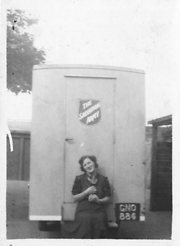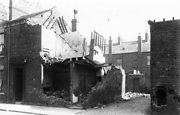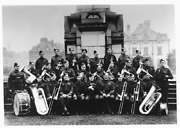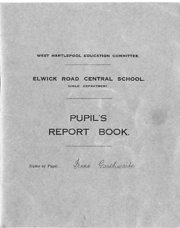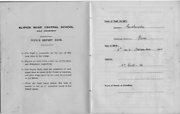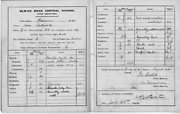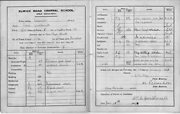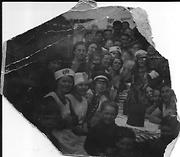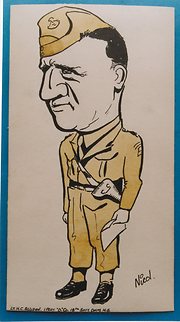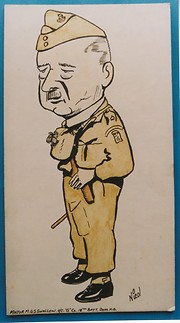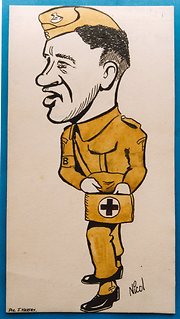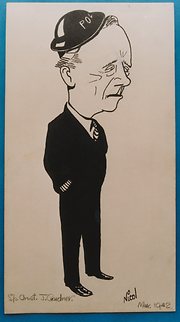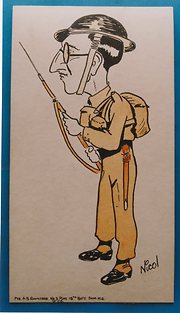 Hartlepool Sports & Leisure
Hartlepool Sports & Leisure
- Cinemas, Theatres & Dance Halls
- Musicians & Bands
- At the Seaside
- Parks & Gardens
- Caravans & Camping
- Sport
 Hartlepool Transport
Hartlepool Transport
- Airfields & Aircraft
- Railways
- Buses & Commercial Vehicles
- Cars & Motorbikes
- The Ferry
- Horse drawn vehicles
 A Potted History Of Hartlepool
A Potted History Of Hartlepool
- Unidentified images
- Sources of information
- Archaeology & Ancient History
- Local Government
- Printed Notices & Papers
- Aerial Photographs
- Events, Visitors & VIPs
 Hartlepool Trade & Industry
Hartlepool Trade & Industry
- Trade Fairs
- Local businesses
- Iron & Steel
- Shops & Shopping
- Fishing industry
- Farming & Rural Landscape
- Pubs, Clubs & Hotels
 Hartlepool Health & Education
Hartlepool Health & Education
- Schools & Colleges
- Hospitals & Workhouses
- Public Health & Utilities
- Ambulance Service
- Police Services
- Fire Services
 Hartlepool People
Hartlepool People
 Hartlepool Places
Hartlepool Places
 Hartlepool at War
Hartlepool at War
 Hartlepool Ships & Shipping
Hartlepool Ships & Shipping

Home Front - Second World War
Details about Home Front - Second World War
A selection of images and documents relating to the 'Home Front', during the Second World War.
Location
Related items () :
 18th Battalion Durham Home Guard
18th Battalion Durham Home Guard
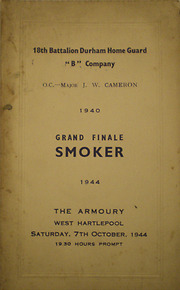 Donated by W Henderson
Donated by W HendersonPart of the Business Cards collection
18th Battalion Durham Home Guard. Flyer for their Grand Finale Smoker in 1944.
More detail » 1943 Wedding of Jack Donkin and Joan Wilson
1943 Wedding of Jack Donkin and Joan Wilson
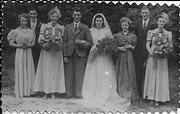 Donated by Elizabeth Donkin
Donated by Elizabeth DonkinDated 1943
The wartime wedding of Jack Donkin and Joan Wilson at St. Joseph's Church in 1943.
More detail » A Wartime Childhood
A Wartime Childhood
In 2005 Hartlepool's Museum and Library Services worked together on a project called 'Their Past, Your Future', which commemorated the part played by local people in the Second World War. As part of the project Jenny reminisced about growing up in the War years. This is her story, in her own words:
Jenny, born in West Hartlepool in 1929. I was ten year old when the war broke out. I went to Jesmond Road School. I had a brother in the regular army who was in China when the war broke out. We lived in Bellerby Terrace, next door to the police station. I had an older sister who was married and another two brothers at home. Neither of them could go in the war, because of health problems, so they did taxi work during the war. I was at school and had two younger sisters at the Open Air School at the top of Thornhill Gardens. It was like an enormous greenhouse to look at it, it was all of glass. They used to give them treatment with sunray lamps, and special food and milk that healthy children didn’t get. This was for children that had weaknesses. Violet had a weak chest, bronchitis and asthma, and Mary had very brittle bones.
Jesmond Road had air raid shelters in the school-yard, and we went there if the sirens went. If it was really bad we just went to school in the mornings, or just in the afternoons, so we had quite a lot of time off school, but we got a lot of homework to do. But I didn’t have much time to do homework, because my father had horses and wagons, and we had stables at the bottom of our gardens, and I used to help with the horses, clearing the stables out, going to the warehouses for fruit and vegetables to take round on the wagons. And I had a good brain, and was a good speller, and I used to do most of the paperwork and work the food coupons out for him, even though I were only twelve year old at the time. We had two horses at the time, a little white pony and a big brown horse called Paddy. When the sirens went, he used to try to kick the stables down because he was terrified. So I had to go down the stables, even if it was the middle of the night I had to get out of bed and go down the stables and sing to this horse, because that’s the only way we could keep him quiet! He loved “When Irish Eyes Are Smiling”.
I used to get up early in the morning, go down the stables, feed them, clean them out and groom them, ready to go in the wagons. Me dad and me mam had a fruit and vegetable business, like they have a mobile shop now, but with horses and carts. When rationing came in we had coupons for this and coupons for that, and points and all the rest of it. My mother was a trained tailoress and dressmaker, and we used to have a lot of things home made, which was very lucky because she wouldn’t have been able to go to shops and buy them, being so many of us. I remember me sister got a great long length of blackout material, and she bleached it and then she died it yellow, and she made the most fantastic outfit, she made a skirt and a jacket and even a hat to go with it, and it looked really smart because it was yellow and she trimmed it with black.
I had to go down to Foster and Armstrong in Stranton every Monday and Thursday to get the horse feed, ‘cos even the horse feed was rationed. I had to go to the farms; there was one at Greatham and there was one at the top of Cameron Bank which was called Johnson’s, and I used to go there to get the cabbages and sprouts, lettuce and beetroots, sacks of potatoes and things like that to sell on the wagons.
I remember one day, it was on a Monday afternoon and the siren went. I was home from school and I went up in the attics and was looking out the window and I saw a bomb go right up between the row of houses, and it landed the other side of the Sacred Heart school, on a little bungalow that was there. All the windows in the school was blown out, yet the windows in our houses never budged, they didn’t even get a crack in them. Luckily the children weren’t at the school that day. I don’t remember being frightened at all, we just took it in our stride.
We used to get ferocious winters, the snow used to be really deep, and you got no extra fuel because coal was rationed. You just had to make do with what you had. We used to go down the beach and get sacks of seacoal. I remember taking seacoal round selling it for sixpence a bucket to people that couldn’t get down to the beach. You only got one sack of coal a week, I think, and food rationing you only got one egg a week, and I think it was two ounces of tea, two ounces of butter, four ounces of margarine and two ounces of lard, four ounces of bacon and eight ounces of meat for each ration book. I had to go along to the Co-operative Stores at the end of Duke Street, I got two pennarth of bacon bones, a sixpenny shank and any scraps off the cutting machine, and I’d take it home to my grandmother that was staying with us at the time. She used to make a big pan of stew, there was no meat in it, just the bacon bones and loads of vegetables and she always made suet dumplings just to help to fill us up.
The only person that got birthday treats was my sister Mary ‘cos more often than not she was in hospital. She got loads of toys – we weren’t allowed to play with them. At Christmas me mother used to get an empty chocolate box, one with a bonny picture and a nice ribbon on the corner, and she’d get a little sixpenny traycloth, or a pinny, or some little thing to be embroidered, and she’d put some silks and a needle and a thimble, and a tiny little pair of scissors in this fancy box, and that was my Christmas present. And off my aunt I got a sixpenny box of paints and a big colouring book. I always got a silver threepenny bit off me grandmother. At Easter me mother would make paste eggs, hardboiled eggs, and they were always coloured, she used to boil them with onion skins and make them really brown, and then me sister used to paint pictures on them. And my Aunt Doreen, she used to buy us a sixpenny chocolate Easter egg from Woolworths. I never remember a birthday.
I was a proper tomboy with being brought up with five lads. Because what they could do, I could do better. If they’d climbed a tree, I’d climb a tree, but I’d climb higher. If they’d run along a wall, I’d run along a wall, but I’d run faster. I had to be better than them.
During the war there was no toys. I used to go down to Lynn Street at Christmas, and there was a shop called Lithgo’s the pram shop, and they always had dolls in at Christmas. And in the window there was this marvellous baby doll, fully clothed, and I longed for that doll. I never got it, but me mother knew I wanted a doll. One year she got me this great big baby doll, it was a celluloide, and I thought it was wonderful. Me sister had made a set of clothes for it and I was playing with this baby doll on Christmas morning, and I must have been about twelve or thirteen. We were called to have our Christmas dinners, so I left me doll in the parlour on the settee. Me grandmother was with us at the time and she was pretty hefty. And when she’d finished her dinner she went back into the parlour and when I went in me doll was on the floor absolutely flattened – she’d sat on it. Being celluloid it just squashed like an eggshell. I broke my heart over that doll, and I got into trouble for leaving it where she could sit on it! I never had another doll, not a new one. But I managed to scrimp and save pennies and ha’pennies by running messages for people, and I saved up because there was a girl at school said she had a doll and would sell me it for thirty shillings. That was an awful lot of money to a child during the war. You’d run to the ends of the earth for a ha’penny. I’d sweep the back street and I’d swill the yard, I’d do anything to get an extra couple of coppers to get this doll. And it had a paper mache head, arms and legs and it wasn’t very beautiful to look at but I thought it was lovely and I called it Ann. And one day me brother Kenneth threw it on top of the shed roof, where I couldn’t get it. Before anybody could come home it started to rain. Well you can imagine what happened to it, being paper mache. It just went to a mush. It was absolutely ruined.
There was a cookery class at school. One day we’d do laundry work, and the next week we had cookery class. I used to love doing the cooking. We used to have to take a couple of vegetables and we always made a great big pan of stew. And the children that didn’t have very much at home, if they took a ha’penny they could have a bowl of this hot soup. And if you took a penny you got a bun as well as the soup. I used to love it when I could go to school and get a bowl of hot soup. ‘Cos more often than not, on the way to school I’d have a slice of dripping bread, that was the fat off the joint, and we’d have a slice of bread about two inches thick with this pork dripping on in your hand, running to school. By the time breaktime came round I was ready for something to eat.
During the war leather was very short, and they used to make wooded-soled clogs for kids and they were one and eleven pence a pair, and I loved those clogs. But one time I got a real good hiding off the old man ‘cos the kiddy-catcher came round asking why Jenny hadn’t been to school. Jenny hadn’t been to school because her mother had got her a real old-fashioned pair of lace-up boots like in the olden days - someone had given my mother these and they fit me so I had to wear them and I wouldn’t go to school in them, I was so ashamed of them. They never bought me girls shoes ‘cos I was so heavy on them. They used to make me wear me brothers’ boots that they grew out of, and I was ashamed of them as well. I was always getting into trouble for something.
I passed the eleven-plus but me father wouldn’t let me go because you had to buy your own uniform and books and everything and they couldn’t afford it. He said “I didn’t bring you up to be a lady. You were brought into this world to work.” So I started working with the old man when I was twelve, heaving hundred-weights of potatoes around and cleaning stables out and grooming horses. I had to help with the washing and the housework and the baking as well.
Me granny used to bake three times a week. She used a stone and a half of white flour and half a stone of brown flour. We never had bought bread, it was always home-made. But me mother used to buy a twopence-ha’penny loaf, a white one, from the top shop for me dad. And he always had the best butter. Us kids had the margarine and the dripping. Dad got the best butter. But he always had his crusts cut off the bread. We used to fight over who was going to have the crusts because they had a little bit of butter on. But I can honestly say we never went hungry. Me mother always made sure we had a hot meal at least once a day. She used to get stale bread off customers for the horses. She used to get the best clean bits out, and soak it in milk, and squeeze it all out and mix it with a handful of sugar, a good sprinkling of mixed spice and a handful of raisins and it was baked and it tasted lovely. And my grandmother used to make custard, and she made it so thick that when it was cold you could slice it. We’d have a slice of cold custard between two slices of bread and we thought it was a treat! Mother used to mash some boiled parsnip and flavour it with banana flavouring so it was like mashed banana, and we’d have that between bread and margarine, and that was a treat ‘cos you couldn’t get real bananas. And we had chickens down the garden and she used to collect the eggs and put them in isinglass, it was this solution you used to put the eggs in to preserve them, so when the eggs were short, we were never short of eggs. Mr grandmother always made the Christmas cake, and she made them a year previous. She used to wrap them up in cloths and keep them for a full year.
Our house had a scullery, a kitchen, a big dining room and a big parlour. One flight up there was a great big bedroom, and a bathroom and an indoor toilet. Up another flight of stairs there was a small bedroom, the big front bedroom which mother and father was in, and the big back bedroom where us three girls slept. Then up another two flights of stairs was three big attics and the lads slept up there. In the back yard there was an outdoor toilet, a great big coalhouse, a bicycle shed and a little conservatory place. Across the back street was a long garden. We had electricity. Me mother had an electric cooker in the kitchen, and she had electric boiler as well. Oh we were very posh! We ate our meals in the kitchen because as kids we weren’t allowed to sit in the dining room. Oh no, it was too posh! That was only for special occasions like Christmas. At Christmas mother would make us what she called a “mistletoe”. It was hoops of an apple barrel, and she’d put them interlocked. She’d wrap crinkle paper round them and tinsel, and hang these little baubles on it and we’d make things out of paper like rosettes and little flowers and animals and we’d get acorns and fir cones and paint them and tie bits of wool on and put them round this “mistletoe”. And that was hung in the kitchen.
We had an Anderson shelter in the garden, but we never used it. Me mother wouldn’t take us out in the garden in the middle of the winter, we used to stop in our own house. The old man used to say “if you’re gonna die you might as well die in bed”.
Me and our Violet were supposed to have gone on this ship to Canada when they were evacuating the children abroad. At the last minute the old man changed his mind and he wouldn’t let us go. Which I am very pleased about because the ship was sunk. So it was just by good luck.
At Christmas time all the family used to come to our house, it being such a big house. My mother’s people come from Ilkley in Yorkshire and they used to get a charabanc to come through at Christmas time. I remember my grandmother and our Lilly paid into this fund so me, our Mary and our Violet could go to this party in me granny’s street.
I met me husband during the war. It was the end of the war, 1945, and I was fifteen. He was in the navy. I had a cousin who wanted me to go out with her on a Sunday night. I knew she used to go to meet these sailors, ‘cos she was older than me. She said “just come with me ‘cos you’re not allowed on the docks on your own, you have to go in pairs.” She said “just come with me, then when we come back off the dock you can come home.” So I went and I wasn’t allowed make-up or anything like that, ‘cos the old man would have killed us. So her boyfriend saw two of us, and he went and got this friend to come with him. So he said “you can’t go home, I’ve come to take you for a walk.” We went to the shows up at Seaton and we were supposed to get the last bus home and we missed it. So we walked home, and by the time I got home it was eleven o’clock. Me mother was out looking for me. She grabbed me by the hair and she made me run all the way home ‘cos she was on her bike. Luckily enough Bob followed us, he didn’t slink off. And me mother thought he was so charming – he could charm the birds off the trees. So she asked him in and gave him a cup of tea and talked to him. And she told him he could call again. The next time he came later in the week he brought some rum. Of course the sun shone out of him after that. She wouldn’t have a word said against him, and I ended up marrying him. I met him in the August and we got married on January 5th. He was nearly twenty-one and I was sixteen in the February but I got married in the January. I didn’t tell the officials because you weren’t allowed to get married under sixteen. But I wanted to get married because his ship was moving down to Harwich and I wanted to go down to his people, because he wouldn’t be able to get back up here. So my mother let us get married. We had a wedding cake, which most girls didn’t have. It was a Christmas cake, and she put almond paste on it. And me wedding dress was powder blue. My sister had made it. She had got a white blanket off someone she knew and she made me a white hat and coat. And we got married in the Registry Office in 1946.
More detail » A Wartime Childhood by Evelyn Mitchell
A Wartime Childhood by Evelyn Mitchell
In 2005 Hartlepool's Museum and Library Services worked together on a project called 'Their Past, Your Future', which commemorated the part played by local people in the Second World War. As part of the project Evelyn Mitchell from the 'Writing Together' group reminisced about her memories as a child. This is her story, in her own words:
I was six when the war started and had just started infant school at Jesmond Road, our part of the school was requisitioned for soldiers so we were farmed out to anyone that had a spare sitting room and was willing to put up with us. The added bonus of this was that we only went to school half a day. I thought this was excellent.
Eventually we were fitted with our gas masks by the ARP and issued with the square boxes to put our masks in and we spent the next few years with them bumping against our bottoms everywhere we went. My brother, who was three years old at that time, was as wide as he was tall and resembled a squat Michelin man, was too young for a junior mask and was issued with a baby gas mask. This looked like a large black rubber egg with a plastic visor and my brother, protesting vigorously, was crammed inside this thing, the trouble was his fat little legs hung outside and he looked just like Humpty Dumpty. There was nothing in between the egg and a junior mask so he was destined to spend the first two years of the war without any protection. My mother was in constant terror that her youngest offspring would be offed in a gas attack. I PRAYED FOR ONE CONSTANTLY.
The war was a year old when it was announced that all children aged five years and over were to be evacuated to Whitby and my cousin Mary and I were to go together. I was in seventh heaven as my maternal grandparents came from Whitby and it had always seemed to me that everybody in the family had been there but me. Off we went, my gas mask bumping against my body in my haste as I scurried along, worrying all the while that she would change her mind (I didn’t trust my mother). We got to the cemetery gates, in sight of where everybody was to meet when she stopped, “You’re not going – if we are going to go we will all go together”, she said. I was dragged off protesting but to no avail. Looking back I have often wondered how I would have coped as the bond with my mother was very strong. My cousin Mary stuck it for two years before absconding, she was picked up in Middlesbrough bus station as she waited for the Hartlepool bus. She was nine years old at the time (mind, she was a masterpiece – everybody said so).
When I moved to junior school we had regular tests on what to do during an air raid/gas attack, by then we had brick shelters built in the school yard with wooden benches built in them. Every few weeks the Fire Brigade would turn up to fill these sheds with black smoke (in lieu of gas) and we would stumble around in complete darkness, wearing our gas masks. If we had dirty faces when we came out our gas masks were leaking. As you can imagine, these tests were not popular with us as we came out with cuts and bruises and the occasional black eye. Mercifully, we were never to use our gas masks or the school air raid shelters and there was great relief all round when they were eventually demolished.
The air raid warden in our street was a Mr Garrington who was over the moon at being appointed warden. He was a nice man who took his ARP duties very seriously; he was on the point of retirement when the war started so it gave him a new lease of life. Unfortunately he became quite pompous and strutted up and down the street telling everybody what to do; he became a bit of a pain in the neck. My father wasn’t the kind of man to suffer fools gladly and regarded our air raid warden as an “old fart” and didn’t hesitate to let him know this. Mr Garrington paid him back by knocking on our door every other night accusing my father of “showing light”. This infuriated my father because the whole street knew it wasn’t true but he still had to go out and check.
My father was in the Home Guard after he was discharged from the army on health grounds; he was considered a prize because he had done his “square bashing” and had been trained to fire a rifle and small arms – but most importantly he had been allowed to keep his rifle (it was before Dunkirk) and his uniform, as it was known he would be going into the Home Guard. My father did a full days work in the shipyard and then reported for guard duty most nights, leaving home about 7 o’clock in the evening and returning about 5 o’clock the following morning face grey with fatigue. Sometimes he was wet to the skin, but he never said where he had been or what he had been doing. He had a couple of hours sleep and went to work. His life was no different to any man still at home, everyone did something. On top of these extra duties everybody had to do fire watching, usually at their place of work or at public buildings. This involved looking out for incendiary bombs which were dropped for the sole purpose of setting fire to buildings.
My mother was one of the street deputy wardens and her best friend was the other, mother manned the hose pipe and her friend was in charge of the stirrup pump. Mother was 4ft 11ins tall and six stone ringing wet and her friend was 5ft 9ins and looked like Olive Oyl. When the ARP turned up to test their fire fighting skills the whole neighbourhood attended to watch as it was better than going to the pictures. The sight of my pint sized mother lying prone in the road trying to hit a bucket with a hose where the water came out in fits and starts, remains with me to this day; her friend, whose job it was to supply the water hadn’t the strength in her legs to raise the water pressure no matter how frantically she pumped away. I don’t think they ever hit that bucket.
Two of my uncles were in the AFSI; as they were in reserved occupations they were not eligible for call up. They both worked for a local builder and were experts in demolishing houses and so, at night they fought fires caused by the bombing and during the day they made the damaged houses safe. It was dangerous and dirty work, especially if they had only a couple of hours sleep the night before but it had to be done as long as the bombs kept falling.
The blackout was a real problem because it was literally what it was – pitch black; if there was no moon you did not know where you where, not that you wanted a moon as it lit up the place like a Christmas tree and the blackout didn’t matter, we were sitting ducks. My mother was in dire need of a new coat before the war started but because of clothes rationing it took two years before she managed to save enough clothing coupons to buy one. She used to borrow books from a library a local newsagent ran as a sideline, it was only a few hundred yards away in a straight line. Unfortunately she couldn’t resist wearing her new coat and, as several streets ran off the road she was using, she veered right in the pitch darkness and walked into a wall. She stumbled home with a broken nose, her new coat held to her face to stem the blood. The coat never recovered. I smashed my front tooth in a similar fashion, only I walked into a lamp post.
More detail »
 A child's view of the War by Ray Cummings
A child's view of the War by Ray Cummings
In 2005 Hartlepool's Museum and Library Services worked together on a project called 'Their Past, Your Future', which commemorated the part played by local people in the Second World War. As part of the project Ray Cummings reminisced about being a child in the War years. This is his story, in his own words:
I was born 1934 and started school in 1939, the year war broke out. I can remember we all gathered in school and the teacher told us what was happening and we were only five year old. Later on about 1940 or ‘41 I went to school with me cousin who was the same age as me. The teacher took her out and told her her father got killed on the beach. He was going down Marine Drive to the beach for sea coal and he’d seen this old chap trying to put a mine in a pram, and he went to stop him and it blew up and they both got killed. Later on they barricaded the beach off, put barbed wire up. There were soldiers there at the Spion Kop area and also on the Town Moor, and we used to go down, my friends and me, and they used to give us sandwiches, bread and jam and things like that. Food was the shortest thing, then. I lived in Mary Street on the Headland, and it was about three streets away from Marine Drive and the seafront. And there was the Steetley Magnesia factory up on the Spion Kop, and the Germans used to come over and try and bomb it. The German bombers used to follow the rivers up to the steelworks around Middlesbrough and come back, and any bombs left got dropped at Steetley or Hartlepool. They dropped this land mine and it hit Marine Drive and all the windows for about three streets were put out. And I can remember another family on the Central Estate where a bomb dropped on a house and the family were killed.
Me father worked in the Steetley Magnesia and my elder brother worked in the shipyard and that was a job were you couldn’t go in the Army. Father and me brother were in the Home Guard and used to bring their guns home, no bullets in but we thought that was a great thing. They had the Army uniform and they had a rifle.
I went to St Bega’s School and they built an air raid shelter there. It was for not only the schools but also people living round that area. And some people had their own shelters in the back garden. Anderson shelters which they got off the government. Me granny lived a street away and she used to come down every night to sleep at our house because she was by herself. She was frightened and we used to take her down the shelter. They took blankets down there. Took maybe food because you might have been there all night. And people used to just sit. There was seats and it was a bit dampish naturally, but we had sing-songs to cheer us up. Then you could hear the siren going and the warden would come down and say “right ho, it’s all clear, back home”. And you got used to it in the end. I knew nothing else but that when I was a boy – War. It was a good time in a way, but a bad time for people. If you seen a telegraph boy going to a house you knew somebody had gone.
You used to hear the German planes coming and you knew they were Germans because there was a sort of different zoom in the engines. And if you went out and looked up you could see the searchlights and then the ack-ack firing at them. I can remember on the docks at Hartlepool they used to have barrage balloons. It was big, full of gas and they used to hang them over the dock areas and if the Germans come low and hit that they used to get entangled in the thing. It was chained, fastened down to the ground. I can remember once when one of the balloons escaped and they had to chase it, and they caught it and brought it back. The balloons were a deterrent in a way, to keep the Germans away from the docks. But they still come over and bombed. They were after Steetley Magnesia because they knew Steetley used to get stuff out of the sea that was going in to make steel. Something in the magnesia they’d got out of the sea was into the making of steel. I don’t think they ever bombed it, but they hit Hartlepool a few times.
I would be about six or seven years old and I didn’t know nothing about what was going on, but me mother and father used to tell us about things and Hitler and all that. We used to listen to the radio a lot to Lord Haw-Haw and all that. You were a bit frightened at the time, you know, because England had nothing to defend ourselves. But it was a great time for the community because we used to get together and help each other. Neighbours helped you. You had a ration book and you only got so much sugar and so much meat and that. But the mothers were great because they used to make a stew called Panakity, with all sorts tossed in, and they baked their own bread. You weren’t hungry, there was always something there when you got home from school. Your mother had done something, or maybe a lady next door had made a pan of stew and there was some left and she gave it to you. Or my mother maybe baked and gave her some stuff. They really got together- communities.
It was a very exciting time for a boy my age. We used to go to the pictures and maybes a cowboy was on, Roy Rogers or something, and then all of a sudden you had to go out because there was the air raid sirens. You had to go down the shelter and listen, wait and then go home. And there was no lights, it was all dark. Mothers and fathers knew if you get caught in an air raid that somebody else will take you down the shelter and help you. You still played your school football and stuff, and it was a great time like that. The footballs had a bladder inside, not like these of the present day. So if you hadn’t a football you had a bladder, and kicked that about. You played cricket with a bit of wood and a few sticks. Or you played “kick the tin”. Another game was bouler. It was a cycle wheel - the steel, what the tyre goes on. Take all the spokes out, you had a ring. And get a bit of wire on a stick and you used to put the wire round it and run around, and it was great. We used to race each other, try to do tricks with it. There was no youth clubs or nothing like that. We used to go all round the town. Your mother would let you out because they knew you were safe, not like there is today. I remember we were going on this trip to West Hartlepool. That was a few miles away. We thought it was great going on the bus, and we won playing another Catholic school, I think it was St. Joseph’s, at football. We were only going a few mile away, and that was great because you never left your little place where you lived. It was like a little village on the Headland and everybody knew you.
At Christmas you used to make streamers for decorations because you couldn’t buy them. You didn’t get a lot of presents. I remember my father knew this chap who used to make these wooden tanks, and we used to get them. Maybes sometimes you got an orange, but you never got no bananas, they were rare. I can’t remember seeing one till after the war. Didn’t know what they were. You used to go round to the butchers and take your ration book. You had the clothing coupons and all, to buy clothes. Or people passed them down. A neighbour had an older son than me, and she passed the clothes down – his clothes to me. In summer a lot of the children played in their bare feet. Now and again you used to get a new pair of boots for the winter. But there again kids grow out of boots and you pass them down to your younger brother. And me father had a last to cobble his own shoes. He got the old rubber off the conveying belts at Steetley Magnesia and put it on our boots. Because you couldn’t get leather, so you put that on your boots. It made you about another six feet taller, but it lasted. And he used to cut our hair. He had these shears and we used to get what they called a “tar brush”. It used to be all cut short with a little tuff on the front. But everybody was like that. There was nobody who would take the Mickey out of you because everybody was the same.
I can remember on VE-Day we listened to the radio and I remember Winston Churchill making his great speeches. And this man with a big drum and all the people with young kids behind him singing and shouting and going round the town, on the Headland, banging this great big drum because the war was over. They had street parties and all the kids were invited. And again the mothers found food, they made cakes and puddings and things like that. Jelly and custard and stuff. We were stuffing ourselves with food which we had never seen. I can remember after the war when men were coming home from Japanese and German prisoner of war camps and they were putting street parties on for them. But the Japanese prisoners of war couldn’t eat a lot of food because they were starved, because their bodies had shrunk.
It’s a great time when the community’s together, and that’s what it should be today. They were very close then.
More detail » ARP Anti-gas Training
ARP Anti-gas Training
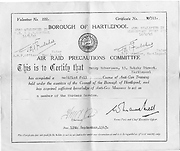 Donated by Mrs. Jean Sutherland
Donated by Mrs. Jean SutherlandDated 1943
Henry Robertson's Certificate awarded on his completion of an Anti-gas traing Course in September 1943.
More detail » ARP Instructors
ARP Instructors
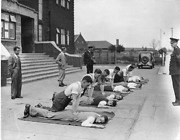 Donated by Hartlepool Museum Service
Donated by Hartlepool Museum ServiceARP Instructors, assisted by Police Officers, teaching revival techniques.
More detail » ARP Wardens
ARP Wardens
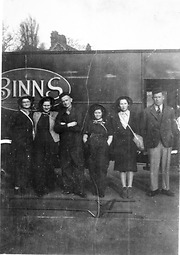 Donated by Hartlepool Museum Service
Donated by Hartlepool Museum ServiceGroup of ARP wardens next to Binns van.
More detail » ARP Wardens
ARP Wardens
 Donated by Hartlepool Museum Service
Donated by Hartlepool Museum ServiceGroup of wardens beside salvation army van.
More detail » ARP Wardens
ARP Wardens
 Donated by Hartlepool Museum Service
Donated by Hartlepool Museum ServiceFive men, three in uniform. two with numbers on their chests.
More detail » ARP women
ARP women
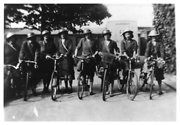 Donated by Hartlepool Museum Service
Donated by Hartlepool Museum ServiceWomen & bicycles at Report centre. Women are wearing military helmets.
More detail » Ada Proctor's (nee Tennick) War Memories
Ada Proctor's (nee Tennick) War Memories
I was born in Sunderland as a twin and at 17 went to Shildon to work in the Auxilliary Fire Service to man telephones and fire watching at the Bishop's Palace in Bishop Auckland on a Sunday.
At 18 I went to Leeds and worked in an aircraft factory making parts and for 12 hour shifts stood at machines milling and drilling but had to leave on medical grounds because of the noise.
I then joined the Land Army, went to Durham to collect my uniform and was sent to Wolviston. I had to put the harness on the horse, yolk up and deliver milk churns. After that, I went to a market garden at Egglescliffe and worked with German prisoners. Being in the Land Army was very hard and not as it is portrayed in films and that makes me mad ! We never let on to farmers that we hadn't done something before or it would be even harder! My wrists were always red and swollen and I remember endless tatie picking, potato snagging and one bad job was picking sprouts with ice on.
Our uniforms were very dull and my twin sister Olive and I (she worked on a farm at Elwick and her picture can be seen with a horse) would go to a stall on Stockton market and buy dusters to make knickers and any bits of ribbon we could find and we used to embroider them to make things look a bit more fancy.
We were allowed one jar of jam a month and had to sign for it.
Eventually I ended up on a farm at Hart and married the local blacksmith.
More detail » Ada Proctor: Digging for Victory
Ada Proctor: Digging for Victory
In 2005 Hartlepool's Museum and Library Services worked together on a project called 'Their Past, Your Future', which commemorated the part played by local people in the Second World War. As part of the project Ada Proctor from the 'Writing Together' group reminisced about the Women's Land Army. This is her story, as told to Chris Eames and Margaret Sanderson
During World War Two, several cries went out to the nation: ‘Dig for Victory’ and ‘Your Country needs YOU!’ were just two of those cries. Owing to a shortage of able-bodied men (they were mostly in the armed forces), the Women’s Land Army was set up, enlisting young women to work on the country’s farms, in an effort to boost the economy and food supplies for this country.
A local young lady – Ada Proctor, (nee Tennicke) – was one among many, including her twin sister, who answered the challenge. Ada, age eighteen, was already working for the war effort, in a munitions factory in Leeds, but, filled with patriotic zeal and youthful energy, she was quick to exchange a factory bench for what must have seemed a more exciting way of life, as the Women’s Land Army promised plenty of fresh country air, plus many new experiences.
The uniform was attractive; fawn cavalry-twill breeches worn with smart polished brown boots, bottle green jerseys over crisp white shirts, finished off with the regulation tie. A fawn overcoat and broad-brimmed hat completed the ensemble.
Ada was offered no training ‘plunged in at the deep end’, she laughingly recalls, remembering the first farm she was sent to. Threshing, which meant working on top of the stack and forking down barley, oats or wheat, was one of her first tasks. A heavy job for a slip of a girl; no mechanical help in those days! Fortunately, an older girl who knew the ‘ropes’ took Ada under her wing and was a great help to her. Only when she was back at the hostel in Wolviston (where all the girls stayed), could she soothe her aching muscles.
Dairy farming and work with animals was next, work that gave Ada a lifelong love of animals and the countryside, which eventually led to her marriage with Bill the local blacksmith.
Working with cows, learning to milk, cleaning out and handling milk churns, which held five gallons of milk, each. She learnt to harness the pony in the trap – a Rolley – and deliver the milk from door to door, using a special ladle to measure out the milk.
Ada can never recall being allowed to have her meals with any of the families she worked for. Her lunches were packed up by Polly, the cook at the hostel, and were chiefly beetroot and cheese sandwiches, washed down with tea from her flask. Sweets and any sort of dessert were in short supply because of rationing; one jar of jam per month was the allowance!
Work on the farm began at 8 o’clock, and most of it was back-breaking especially during the potato picking season, as it was all done by hand, the same as gathering leeks and sprouts. Ada mostly enjoyed the contact with livestock – though one cow, she recalls with horror, had its own livestock, running all over its body – mites! Nevertheless, she took to milking and dairy work as if born to it. What she didn’t enjoy was the occasional slap round the face from a dirty, wet, cows tail! That, she says, is where the notion of the job being romantic ended!
One memorable Christmas Day, she spent in the cow-byre, washing and grooming the herd, and the winter of 1947, when snow fell all over the country to a depth of 4 feet, making roads, lanes and fields impossible to reach, Ada and friends had, somehow, to feed and water stranded animals.
Land Army girls were not the only ‘helpers’ on farms during those years. Prisoners of war appeared on many farms where Ada worked. Asked if she ever felt threatened by their presence – they were after all, our enemies – she replied that she never had, and furthermore, found the men polite and courteous, despite the language difficulty.
As the war continued, so did Ada’s education on the land. She learned to drive a tractor, herd sheep, harness horses – and discovered the cure for a sprained wrist! (Her own sprained wrist)! An old farmer urged her to try his favourite remedy for sprains – maiden’s water and barley!
All the farms were without electricity. Oil lamps, flat irons and earth closets were the order of the day. Despite the hardships of rural life, there was great camaraderie among the Army girls, who usually met up for some social life, dancing and meeting young men, at the Sappers Camp at Greatham. Great friendships which last to this day, were forged during those times, and the ‘girls’ still meet up at their annual reunions. Sadly, the Women’s Land Army and stalwarts like Ada Proctor, have until recently, gone unrecognised.
Only in recent years, have these proud and courageous women taken their rightful place at Remembrance Services and such.
Those gallant girls worked their hearts out, playing their part and digging for the victory that this country of ours accomplished, and we salute them all.
More detail »
 Air Raid Diaries 1940 by Joan Dalkin
Air Raid Diaries 1940 by Joan Dalkin
Joan Dalkin was born in 1921. At the time of keeping this diary she was working as a secretary at the shipbuilding firm of William Gray & Co. Ltd. During the war she lived with her parents at 4 Brougham Street, Hartlepool.
Air raid warnings at Hartlepool during 1940
|
January 29th |
Air raid warning 9.30 to 10.30 |
|
February 16th |
Cossack rescue 300 men from prison ship Altmark in Norwegian waters. |
|
March 13th |
Peace between Russia and Finland |
|
May 9th |
Germany invade Holland and Belgium |
|
May 23rd |
Germans capture Bologne |
|
June 6th |
605 000 men arrived in England from Dunkirk |
|
June 7th |
Air raid warning 1:10am to 1:50am |
|
June 8th |
Air raid warning 1:58am to 2:07am |
|
June 10th |
Italy declared war on Allies |
|
June 13th |
6 000 English men captured by Germans in France |
|
June 14th |
Germans enter Paris |
|
June 17th |
French have asked Germans for peace terms |
|
June 18th |
French are still fighting |
|
June 19th |
Air raid 11:15 until 4. Went to bed 3:15. Bombs dropped on Musgrave Street. Two people killed, several injured. |
|
June 21st |
Air raid warning 1:10am to 1:50am. |
|
June 22nd |
French ship sunk off Tees, 150 workmen onboard, only eight saved. |
|
June 23rd |
French accepted terms from Hitler. Armistice signed 16:50pm (Saturday). Terms not known by French people. |
|
June 24th |
Air raids on London, SE coast and Midlands. Three people killed. French colonies are to fight on. |
|
June 25th |
Air raid 11:55pm to 2:30am. No bombs on Hartlepool. |
|
June 26th |
Air raid 12:05am until 1:50am. No bombs on Hartlepool. |
|
June 27th |
No siren sounded but in shelter from 12:45am until 2:30am. Bombs dropped on Middlesbro. |
|
June 30th |
Air raid from 12:15am until 1:35am. No bombs on Hartlepool. |
|
July 1st |
Air raid on Scotland about 8pm. |
|
July 2nd |
Air raid at Newcastle 5:30pm. Many injured, ten dead. Plane brought down off Hartlepool. |
|
July 3rd |
One plane brought down off ?? early this morning. |
|
July 4th |
French navy attacked by British, many vessels taken others destroyed. |
|
July 5th |
Remainder of French navy ordered by Petain to attack British Fleet. Air raid 12:15am until 2:50am. Gunfire heard. |
|
July 6th |
Air raid 10:30pm until 11:20pm. Gunfire heard 1am until 2:30am. Bombs dropped off Fairy Cove battery into sea. |
|
July 7th |
10:45 until 10:47 gunfire after all-clear12:20am until 12:45am. |
|
July 10th |
Air raid 11:35pm until 12:40am air raid 5:45am until 6:15am. Gunfire first time. |
|
July 11th |
Air raid 2:45am until 2:30am. No bombs dropped on Hartlepool. |
|
July 12th |
Air raid 11:50pm until 1:35am. Gunfire. Air raid 3:20am until3:30am. Nothing happened. |
|
July 13th |
Air raids 6:25pm until 6:40pm; 2:55am until 3:35am; 3:40am until 4:10am. Nothing happened. |
|
July 15th |
Air raid 11:15pm until 2:20am. Gunfire. |
|
July 16th |
Air raid 11:37pm until 1:35am. Gunfire. |
|
July 18th |
Air raid 11:57pm until 1:35am. Gunfire in distance. |
|
July 19th |
Air raid 11:55pm until 12:40am. Nothing happened. Gunfire about 3am, no warning. |
|
July 20th |
Air raid 12:50am until 2:20am. Bombs dropped on Tin Box Factory. Nobody killed. |
|
July 21st |
Air raid 11:58pm until 2:20am. Gunfire. Estonia, Latvia, Lithuania joined Soviet Union. |
|
July 22nd |
Air raid 11:46pm until 12:26am. Gunfire in distance. |
|
July 23rd |
Air raid 3:40am until 3:50am (action before raid warning). |
|
July 26th |
Air raid 11:50pm until 1:45am. Gunfire. |
|
July 29th |
Japan has arrested British subjects. |
|
July 30th |
Mr Churchill visited Seaton Carew. Did not see him. |
|
August 1st |
Air raid 12:15am until 1:45am. Gunfire. Leaflets dropped in south-west etc. |
|
August 2nd |
Air aid 12:10am until 1:30am. |
|
August 3rd |
Air raid 12:10am until 1am. |
|
August 5th |
Air raid 10:40pm until 1:20am. Gunfire. |
|
August 7th |
Air raid 11:05pm until 12:20am. |
|
August 8th |
Air raid 11:10pm until 12:20am. |
|
August 9th |
Air raid 2:20am until 2:50am. |
|
August 11th |
Air raid 11:55pm until 2:25am. |
|
August 12th |
Air raid 10:50pm until 1:30am. Gunfire. Sixty-two planes shot down. Thirteen Allied down, two pilots safe. |
|
August 13th |
Seventy-eight planes shot down off south coast. Thirteen of Allied planes missing. Ten pilots safe. |
|
August 14th |
Air raid 11:10pm until 1:30am. |
|
August 15th |
Air raid 1:03pm until 2:15pm. Very heavy gunfire. One plane brought down. One British landed on golf course. Air raid 11:10pm until 11:35pm; air raid 11:55pm until 12:35am. Pilot of plane still alive. 180 planes brought down. |
|
August 19th |
Air raid 10:15pm until 10:50pm; 11:30pm until 12:30am; 1:40am until 2:20am. Gunfire. |
|
August 22nd |
Air raid 12:40am until 1:40am. |
|
August 23rd |
Air raid 2:20am until 2:38am. |
|
August 24th |
Air raid 12:35am until 5:05am. Gunfire, bombs at West Hartlepool SW. |
|
August 25th |
Air raid 10:22pm until 11:10pm; 12:10am until 3:15am. Gunfire, bombs at West Hartlepool. |
|
August 26th |
Air raid 10:25pm until 3:45am, heaviest gun fire yet. Bombs dropped in Church Street “Edgar Phillips”, three killed. |
|
August 27th |
Air raid 11:30pm until 1:30am; 2:30am until 3:30am. No gunfire. Bombs in distance. |
|
August 26th |
Air raid 10:10pm until 10:48pm. |
|
August 29th |
Air raid 10:50pm until 12:20am; 1:20am until 5:05am. Gunfire, bombs dropped Hilda Street, Mainsforth Terrace. |
|
August 30th |
Air raid 8:50pm until 9pm; 11:45pm until 12:15am. Nothing happened. |
|
August 31st |
Air raid 12:25am until 3:25am. |
|
September 1st |
Air raid 12:25am until 3:25am. |
|
September 2nd |
Air raid 10:10pm until 12:20am; 1:10am until 2:25am. Gunfire etc. |
|
September 3rd |
Air raid 10:10pm until 11:57pm; 12:25am until 12:40am; 12:55am until 1:40am. Gunfire etc. |
|
September 4th |
Air raid 10:55pm until 11:40pm; 1am until 4:22am. |
|
September 5th |
Air raid 10:25pm until 2:25am. Gunfire in distance. |
|
September 6th |
King Carol of Rumania abdicated in favour of his son. Air raid 10:25pm until 2:25am. |
|
September 7th |
Air raid 1:15pm until 1:25pm; 12:15am until 12:20am; 1:15am until 2am. |
|
September 8th |
Air raid 2:15am until 3:35am |
|
September 9th |
Air raid 9:15pm until 9:20pm; 2:15am until 3:50am. |
|
September 10th |
Air raid 2am until 3am. |
|
September 12th |
Air raids 11:55pm until 1:20am; 4am until 4:30am. |
|
September 14th |
Air raid 10:30am until 10:50am. |
|
September 15th |
Air raid 3:05am until 4:10am. |
|
September 16th |
Air raid 2:40pm until 2:55pm; 3:55pm until 4:20pm; 6:45pm until 7:10pm; 7:45pm until 8:50pm; 9:30pm until 9:45pm; 2:15am until ? |
|
September 18th |
Air raid 3pm until 3:20pm; 8:50pm until 9:45pm. Gunfire. |
|
September 19th |
5pm until 5:40pm; 1:05pm until 10pm; 12:15am until1245am. |
|
September 21st |
Air raid 7:10am until 7:15am; 8:30pm until 8:50pm; 9:35pm until 12pm; 1:25am until 1:50am. |
|
September 22nd |
Air raid 3:45am until 3:55am. |
|
September 23rd |
Air raid 4am until 6am. Gunfire etc. |
|
September 24th |
3:55am until 5:55am. |
|
September 26th |
11:05am until 11:30am. |
|
September 28th |
Air raid 3:35am until 4:25am. |
|
September 29th |
Air raid 5:15pm until 5:35pm; 3:45am until 4:15am. |
|
September 30th |
Air raid 12:30am until 1:25am. |
|
October 1st |
Air raid 12:15am until 12:30am; 1:15am until 1:33am. |
|
October 2nd |
Air raid 12:30am until 12:55am; 1:15am until 1:33am. |
|
October 5th |
11:50pm until 1am. |
|
October 7th |
Air raid 8:15pm until 9:45pm; 9:55pm until 10:25pm. |
|
October 8th |
Air raid 11:35pm until 11:45pm. |
|
October 9th |
Air raid 8:45pm until 10:35pm. Gunfire etc. |
|
October 10th |
8:15pm until 10:15pm; 10:35pm until 11pm; 4am until 4:35am. |
|
October 11th |
Air raid 8:30pm until 10:30pm; 11:45pm until 1:45am. |
|
October 12th |
Air raid 8:07pm until 8:45pm. Examination ship bombed, sinking in dock. |
|
October 13th |
7:35pm until 8:45pm. |
|
October 14th |
2:35am until 2:50am. |
|
October 16th |
Air raid 8pm until 8:20pm; 2:35am until 2:50am. |
|
October 19th |
Air raid 8:20pm until 8:55pm; 9:40pm until 10:35pm; 11:35pm until 11:50pm; 1:15am until 1:45am. Slept through the last one. |
|
October 20th |
Air raid 7:50pm until 9:10pm; 3:10am until 4am. MEMORANDA: 126 raids. |
|
October 21st |
Air raid 8:25pm until 9pm; 11:50pm until 1:10am. Slept through last one. |
|
October 23rd |
7:25pm until 7:35pm; 11:10pm until 11:35pm; 3:20am until? |
|
October 24th |
Air raid 9:30pm until 9:45pm; 11:30pm until 2:20am. |
|
October 25th |
Air raid 12:20am until 1:40am. |
|
October 26th |
Air raid 7:35pm until 8pm; 12am until 1am; 1:15am until 1:40am; 2am until 2:30am. |
|
October 27th |
Air raid 5:45pm until 7:10pm; 8pm until 8:20pm; 9:45pm until 10:50pm; 12:25pm until 2:30am. |
|
October 28th |
Air raid 8:45pm until 12:15pm; 3am until 4:30am. Italy invaded Greece. |
|
October 29th |
5:50pm until 7:10pm; 8:30pm until 8:50pm; 9:25pm until 11:15pm; 12pm until 2:15am; 3:15am until 4am. |
|
October 30th |
1:35pm until 2:30pm; 8:30pm until 8:55pm. |
|
November 1st |
6:45am until 7:15am; 1:37pm until 1:57pm; 5:30pm until 6:40pm; 10:30pm until 11pm. |
|
November 2nd |
British troops landed at Crete. |
|
November 3rd |
5:45pm until 6:40pm. Breerge Annie mined off Hartlepool. |
|
November 4th |
Air raid 3:15pm until 4:05pm. |
|
November 5th |
5pm until 5:20pm; 5:45pm until 6:05pm; 11pm until 11:30pm. Roosevelt re-elected. |
|
November 8th |
Air raid 8:20pm until 10:25pm; |
|
November 9th |
Air raid 7:45am until 9am; 6:40pm until 7pm. Mr Neville Chamberlain died. |
|
November 12th |
Jervis Bay saved 35 ships in convoy (three not saved) when attacked by P. Battleship. |
|
November 13th |
Air raid 11:05pm until 12:10am. |
|
November 17th |
1am until 8am. |
|
November 18th |
Air raid 8:10pm until 10:40pm. |
|
November 20th |
Hungary joined Axis. |
|
November 21st |
Air raid 3:40pm until 3:50pm. |
|
November 23rd |
Air raid 6:20pm until 7:10pm. |
|
December 11th |
Greeks captured over 20 000 Italians. |
|
December 12th |
Gunfire no siren. Lord Lathian, British Ambassador to America died suddenly. |
|
December 13th |
Air raid 8:20pm until 9:10pm. |
 Air Raid Patrol by Margaret Brain
Air Raid Patrol by Margaret Brain
In 2005 Hartlepool's Museum and Library Services worked together on a project called 'Their Past, Your Future', which commemorated the part played by local people in the Second World War. As part of the project Margaret Brain from the 'Writing Together' group reminisced about her experiences of Air Raids. This is her story, in her own words:
When I was fifteen I left school and became a clerk at a fruit merchants in Whitby Street. This was soon after a bomb had destroyed St James’ church and a school in Musgrave Street. As a result, the windows in our office were partly boarded up which made the office quite dark.
My uncle was a leader in a demolition squad involved in rescuing people who were trapped in the ruins of bombed buildings. One night we had an air raid and the first land mine ever was dropped in Elwick Road damaging a large number of properties and killing about eleven people.
Most houses had an Anderson shelter in the back garden but we had a Morrison shelter. The shelter consisted of a large sheet of cast iron surrounded by cage wire. It was more than double bed size and was always made up for a bed. My mother used the top of the shelter as a table for cutting out clothes patterns.
I remember going to the Forum cinema one night when there was an air raid warning. My friend and I decided to stay and watch the film, but eventually, the sound of bombs being falling drove us out into the street to seek shelter. Outside, the sky was alight with flares being dropped by the enemy aircraft so that they could see their targets. The planes were trying to hit the steelworks and shipyards.
At the age of eighteen many women were conscripted to work in factories or munitions. I wanted to join the Women’s Royal Naval Service but by the time I was of age to enrol, the government of the day decided not to take on any more recruits and so closed entry. However, my boss decided that I should apply for deferment since we were so short staffed.
My immediate boss was an Air Raid Precaution Warden in his village of Greatham. He was also in the Home Guard and did fire watching at night. All this work made him ill and as a result my work load increased. I was then deferred right up to the end of the war. During this time I began work at the report centre which was based underground at the Gray Art Gallery. I did shifts every fourth day after my normal day at the office. During an air raid we had to man the phones and report casualties and damage. We slept in the Art Gallery when it was quiet. We had screened beds and bedding and downstairs we could play table tennis or snooker. The young messenger boys had sleeping quarters downstairs, their job was to take messages on bicycles throughout the town to those caught up in the aftermath of war. We were paid a little money and it helped to supplement our small amount of wages.
At the end of the War, I became a blood donor which was a comparatively new thing at the time.
More detail » Air Raid Precaution Instructors (ARP)
Air Raid Precaution Instructors (ARP)
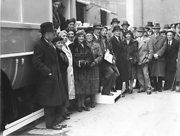 Donated by Hartlepool Museum Service
Donated by Hartlepool Museum ServiceTaken in front of mobile canteen before going off to see some bomb damage.
Some of the people in the picture look like dignitaries which is borne out by the presence of a senior police officer.
Picture possibly taken in Museum Road with the ABC cinema on the right and the old Police Station in the background.
More detail »
 Air Raids and Babies by Edith Lund
Air Raids and Babies by Edith Lund
In 2005 Hartlepool's Museum and Library Services worked together on a project called 'Their Past, Your Future', which commemorated the part played by local people in the Second World War. As part of the project Edith Lund reminisced about her life as a young mother in the War years. This is her story, in her own words:
I was married in 1938. I was living in Streatham Street and my husband was in the Artillery and I used to write him all these letters. Well I wrote him a letter and I wanted to post it to him. I took the little one, he was about a year and three months old, I took him with me to the Post Office which was in Whitby Street, which was quite a walk, because I wanted a stamp to put on it. So I put a stamp on and posted it in the box and I was coming back, and I just got into Musgrave Street and the siren went. Well, he couldn’t walk very far cos he was only a baby, so I picked him up and tried to run a bit, but I couldn’t. I put him down again and the warden in Musgrave Street said “get off the streets, didn’t you hear the siren go?” I said “yes, I heard it, but I can’t get home any quicker.” I was pregnant at the time, it was just before I had the baby, I think, and of course I couldn’t run very quick. I got round into Rokeby Street, just past the school, and all of a sudden me brother, he’d come home on leave from the Air Force, and he come racing down and he grabbed the baby and grabbed hold of me hand and he raced back with me, back to the house, got into the house, under the stairs. All of a sudden they dropped the bombs. And the poor warden I’d been speaking to, he was killed. I felt so sorry for him. Cos he was worried about me and he was killed hiself. Our roof was hit, and we were sitting underneath the stairs. It never come through the stairs, so we were lucky. Everything was shattered all over the stairs, parts of the roof; you could look straight up and see the sky. And the floor was about six to ten inches in soot, because everybody then had coal fires, so the chimney pots was down. The curtains and the window frame was out in the street. So how lucky, because people got worse than that because all those in Musgrave Street, the shops got knocked down, there was the fish shop called Moons, then there was a doctors and the cobblers, the Fruit Market, all knocked down, nothing left. I felt sorry for them, I did. Anyhow, we stopped under the stairs until the all-clear went, and we come out, we just couldn’t believe it.
Anyway, we got over it, and got the house all cleaned up and everything. Took some doing; I could smell soot for weeks after. I lived in the house on my own with the children. We had two bedrooms and a sitting room and a kitchen. Outside loo and an outside coalhouse. There was a fireman, Mr Mitchell, they called him, lived three doors from us and he got the signal when he was wanted. He had to go straight to …just past Burbank Street there was a place where all the firemen were and when he got the alert we knew the air raid siren would be going any minute. So we used to get the kids, get them all ready, get the gas masks and everything and be all ready for when the siren went and then we’d run straight to the shelter and we’d sit there all night. Oh, there must have been eighty to a hundred people in those shelters. Just wooden forms all the way round and some people would lay blankets down and go to sleep, but I had two babies so I couldn’t sleep. Once when I was in this shelter, my brother was on leave and he sat with me and I felt as if I was going to pass out. I said “I’ll have to have some fresh air, I can’t breathe”. He said “come on, I’ll take you on top”. So we had to go up these steps to get out of this shelter. The warden said “where are you going? The air raids on, you know”. Then all of a sudden we heard the planes. Me brother was in the Air Force and he was listening. He said “that one’s not ours”. All of a sudden a plane swooped down and he pushed me down the stairs and he jumped down after me and the warden come in after us and managed to slam the doors shut. You could hear, it went all over the doors – he dived down and it was firing at the air raid shelter as we went in again. So that was twice I nearly had it!
If you went to the pictures and the siren went anybody who wanted could go out to the shelters. There was a shelter in Grange Road; it used to be a big field there, they called it the Bull Field and they had a big shelter on there. Those that didn’t want to they’d sit right underneath where the circle is. This one night – I never used to get out – me dad said “go on, go to the pictures, I’ll keep an eye to the kids”. Well all of a sudden it come on the screen “the siren’s just gone”, so I jumped up straight away, I wasn’t going to leave the kids with me dad. Just as I got into Stockton Street I heard this plane zooming down so I went into a shop doorway; it was a jewellery shop and I crouched right down. And all of a sudden I seen this plane and it was just like a beautiful big silver brooch and all the searchlights was on it. And it looked so beautiful. And I thought “eeh, that must be one of them, they must be going to shoot it down.” Then all of a sudden another one zoomed down and started firing at all the shop windows. And I was crouched right in the corner on the floor and all the glass windows in the shop was all shot, all smithereens and pieces. As soon as it went off I ran all the way home until I got to the house and me mother said “where have you been when they were dropping the bombs?” When I told her she said “oh, you shouldn’t have gone to the pictures”.
I kept moving around because I was frightened of the bombs and thinking I’d escape them. I went to live in Mainsforth Terrace and downstairs there was a cellar. I was in there with the two babies and there was a raid on and I was terrified and I daren’t go down the cellar because I kept hearing noises. I thought “there’s somebody gone in the cellar” and I was scared to death. I took the babies and got underneath the bed – I don’t know what I thought that would do! When he come home he went downstairs to have a look. He come back up, he said “ don’t ever go down there – it’s full of rats!” So I had to move again! I moved about half a dozen times, I was like a gypsy – one place to another.
Rations! Oh, my God, they were a headache. We didn’t have a lot of money so we couldn’t buy a lot of sweets, but we used to make a special day for the kids to have the sweets. Him being in the army, he sent me a food parcel once. There was all sorts in it. There was chocolate in for the kids and there was butter, there was even eggs in and all sorts and oh, I was over the moon! So my next-door neighbour, I helped her a bit. But that’s what you had to do, you had to help each other. I helped them all, but they helped me so it’s only fair. I used to take a coat of mine, cut it up and make trousers for my little lads and I used to do it all by hand, I didn’t have a sewing machine. Once a saw a remnant in a shop, a bit of satin and it was beautiful and it only cost coppers because it was only in pieces. It was a peach colour, and the other was very pale green with little flowers in it. So I bought it – I thought “what am I going to do with it?” So I made myself two pairs of French knickers! I showed me neighbour and everybody in the street wanted me to make them French knickers. My knickers went all the way round the street! I was knitting jumpers while I could, while you could get the wool. I used to make the hooky mats; clip mats with the old socks. I used to wash them and cut them up into little strips and take a peg and break it in half get the kids and show them how to do it. And I had all the kids helping me and I made a great big hooky mat and it was all framed black all the way round and coloured in the centre and it was lovely. But there was only one thing; it was too heavy, I couldn’t shake it. The kids had to help me.
When we were washing we used to have all our lines out in the back lane, right across from one end of the lane to the other. I’d get up at half past six in the morning to get me lines out. Then the coal man would come round with his horse and cart, they called him Tommy Burbeck, and he’d shout “Coal!” so we knew he was coming, so we’d take the sheets off and put the prop to hold them right up. But then the bin men used to come round, and their’s used to be a horse and cart and they used to just come and knock all the sheets down and everything; they didn’t care, they were really nasty. And the sheets used to always be lovely and white. We used to scrub everything. We had a big wooden tub and a big poss stick - mind we had to be strong. I had a big wooden table outside in the back yard and I’ve stood out there in the snow. I had a cape round me neck what he got in the army – it was a waterproof and he gave me it. And I would scrub everything and I would put it in the poss tub and give it a good poss and then put them through the little mangle and then put it in a copper and put all the fire underneath. The only way I used to get my copper going was I used to put old Wellingtons in and the flames used to come out the top and then the water would boil. We used to boil everything, all our clothes because although we had nothing we were spotless. I used to boil them all, then put them back in a big tub of water, poss them all again. No wonder we had big arms! Then we had to hang them on the line and try and dry them. And if we couldn’t get them dry we’d have to dry them round the fire, oh….Washday started on the morning and it was teatime before we got finished and then we were still trying to dry them round the fire. Then there was the ironing after that. The irons we used to put on the fire, I had two of them. Me dad used to work the shipyard. He used to make me pokers and shovels and all sorts. We couldn’t do any papering because you couldn’t get paper then, so we used to keep the newspapers and I used to paper the wall with newspapers and then it was called distemper, and I used to do it all nice colour, very pale colour, and then I’d go and get me husband’s shaving brush and I’d get a different colour and I’d make little marks like little roses all over. You had to improvise for everything you wanted. They were hard times, but it’s a funny thing, when the war was over you seemed to miss it, because it had been excitement as well.
When Sammy come home, of course, I had another baby. That’s what happened then, because there was no preventions, nothing like that then. So every time they come home on leave they used to always leave something behind! So I was expecting a baby and of course you couldn’t get the ambulance then, because it was all for the war; they had all the ambulances, so I had to have a taxi. And I was booked in at Grantully Nursing Home because I used to have terrible times having me babies, they were always breach babies and so the nurse said “you’ll have to go into hospital next time.” I had the first one at home and I nearly lost me life, and they said “you should have them in hospital”. The second one I had at home and I lived in Grace Street then. I had such a time, the nurse couldn’t bring the baby and in the finish she brought the baby and she said “it’s a shame, it’s a beautiful baby boy, but he’s died”. And they put him on the chair and this old lady, she was about eighty, she picked the baby up and the nurse was messing on with me because I had such a bad time and all of a sudden I heard the baby cry. The nurse said “how did you do it?” She’d been breathing into his mouth. The old woman brought him round. So this time they took me to Grantully. The air raid siren was going as we got into Grantully, and they got me in and they put me on this bed, like, and they were saying “you’ll have to try and push” – well it was a breach baby, you couldn’t do anything about it! They were trying and trying and at the finish they said “you’re not ready to have it yet” and they just left me! They went away and I was in torture. Then all of a sudden the siren went again and then they started dropping bombs so they had to get hold of me and pull me up the bed. I said “the baby’s coming!” They said “well you can’t have it now, you should have had it before” as if I had a choice in it! And so in the finish they had to stop while they were dropping the bombs, I had the baby, then they said “quick, you’ll have to get down in the cellar”. I just collapsed on the floor, I couldn’t walk. So a nurse got hold of me hand and she wrapped the baby in something and they took us all down in the cellar and they brought all the babies and they gave me a baby to hold. And then when we got back upstairs we found out I hadn’t the right baby! It was someone else’s baby – it was a little girl and mine was a little boy! After my husband come home, he said “that’s not my baby”, but when he grew up he was the image of him!
You had to pay for a doctor in those days, sixpence a week, and my poor doctor never got his sixpence. Nobody paid. Some doctors you had to, but mine was Dr Hillis, he was such a good doctor. I paid for quite a while and then I couldn’t pay much more. Me first baby, it was a nurse from Grantully who come to see me. It was a breach baby and she didn’t know anything to do. She didn’t know how to bring it, so she just sat there. And there was a neighbour with her, ever so many people, all sitting there having a cup of tea and I was under the table screaming in agony. And a neighbour went round for my doctor and he come round in his car in his pyjamas and he borrowed an apron off somebody and he give me something to knock me out. Anyhow he gradually got the baby out, and he got me in bed and he chased the nurse. He said “go back to Grantully Nursing Home and be taught how to deliver a baby.” And he come in every day till I got all right and he was really smashing. And when I went to pay he said “can you afford that? Leave it this week.” How many doctors would you find like that these days? I had four lads at the finish born during the war, and two girls born after the war.
More detail » Air Raids by John Lee
Air Raids by John Lee
In 2005 Hartlepool's Museum and Library Services worked together on a project called 'Their Past, Your Future', which commemorated the part played by local people in the Second World War. As part of the project John Lee, from the 'Writing Together' group, reminisced about his time in the messenger service. This is his story:
In December 1939 an underground report centre was established in the grounds of Grays Museum, this was the nerve centre for all civil defence operations, a hub of activity at the outbreak of war. It was here that A.R.P. messengers, drawn from the boy scouts, boys brigade and civilian population provided a service throughout the town, relaying information to the various civil defence groups.
West Hartlepool was one of the first industrial towns in the country to experience the horror of German bombs, and for Mr Lee, his first taste of enemy action. In 1940 four bombs were dropped. Two people were killed, and sixty- three injured. Over two hundred properties were destroyed or damaged. Four bombs fell at Gunners Vale Farm at Elwick. Buildings were demolished, but the farmer and seven others survived after taking refuge in a home made shelter. Mr Lee’s sister found her shop in Musgrave Street had taken a direct hit.
It was in this first raid that an air raid warden was killed by enemy action. This brave man was Mr John Punton of William Street.
The raids continued and grew in intensity. Mr Lee was witness to the fire at Tin Boxes Ltd which suffered a direct hit. Devastation spread across the town. The work of civil defence went on regardless. The attitude of the people, brave and unbending. A report in the Northern Daily Mail read:
“The quiet demeanour and cool efficiency of hundreds of A.R.P. workers, paid and unpaid men and women, not to mention all the boy messengers, was an unfailing support to public morale.”
Mr Lee recalls a particularly tragic time when three women and six children died in a bombed out cellar, despite the efforts of the demolition squads who laboured night and day to save them.
Throughout the war Mr Lee divided his time between the steel works, and the messenger service. A harsh environment existed in the steelworks. The working conditions were intolerably hot and dusty due to the blackout requirements imposed by the government. The atmosphere was laden with dust and fumes making visibility very difficult and a safety hazard.
In 1941 the house in which the grandparents of Mr Lee were sheltering was bombed. The family of seven had taken cover in a bedplace under the stairs. They were extracted from the ruins within twenty minutes. When Mr Lee arrived Grandad was sitting in an armchair in the middle of the road giving all his worldly goods away. He was obviously suffering from shock!
Thankfully the last record of air raids was made on March 22nd 1943. Ever vigilant, the work of the Civil Defence continued, until at last we could all sleep safe in our beds.
The bravery of those engaged in the defence of our country has not been forgotten.
More detail » Air Raids on the Hartlepools in World War II
Air Raids on the Hartlepools in World War II
Introduction
In the Second World War, the twin towns of Hartlepool and West Hartlepool were both victims of German air raids. Air raids on the Hartlepools took place between June 1940 and March 1943. Seventy people were killed during that time, including the first Civil Defence worker to be killed by enemy action. The two towns were both centres of heavy industry, such as shipbuilding, engineering, steelworks, and boilermaking which made them prime targets. The north-east coast of England is also near enough to Germany for it to be possible to fly a plane across the North Sea, drop explosives on a target and return home before running short of fuel.
There were forty-three raids on the two towns in total with seventy deaths, forty-eight at West Hartlepool and twenty-two at Hartlepool. Although the aim was to destroy any industry which would help the British war effort, the bombs hit houses, shops, and other buildings such as factories, churches and hotels.
The people of the Hartlepools had many warnings which did not result in a raid on the towns. West Hartlepool had 480 warnings, but there were only thirty-six raids where bombs were dropped. Many of the raids happened during night hours, and were usually carried out during the favourable weather of the summer months.
ARP (Air Raid Precautions) in the Hartlepools
ARP was initially formed before the start of the war in 1935. Preparations for protecting civilians were already in hand before the outbreak of war. By September 1938 ARP had seventy trained wardens in West Hartlepool. A few months after the outbreak of war on 3rd September 1939 the number had increased to 1500. There was a similar growth in the number of wardens in Hartlepool. ARP arrangements were thus already in place by the summer of 1940, when the raids started. The first British civil defence worker to be killed by enemy action died in West Hartlepool on 19th June, 1940. He was John Punton, aged fifty-four. He was directing other people towards the nearest air raid shelter, when a bomb fell nearby and he was killed in the blast.
Bomb damage in West Hartlepool
5745 buildings were damaged at West Hartlepool. 251 were damaged twice, nine damaged more than twice. More than a hundred buildings were completely demolished. These included the Yorkshire Penny Bank, three hotels and the offices of the West Hartlepool Greyhound Stadium.
Only seven raids caused serious damage or casualties. Three raids caused thirty-eight of the deaths. On night of 19th August 1941 twenty-three people were killed when a large mine fell in back Houghton Street and Elwick Road, also causing much property damage. There were also five people seriously injured and sixty-five slightly injured. On the night of August 29th and 30th 1940, Pilgrim Street and Hilda Street were hit. One man, three women and three children died when nineteen houses were demolished.
Bomb damage in Hartlepool
Two raids accounted for all but one of the twenty-two fatalities in Hartlepool. On 12th May 1941 a “stick” of bombs fell across the Headland. One fell in Lumley Square, killing twelve people, including all the members of one family. The previous year, on 13th Sept 1940, a man was killed near an air raid shelter at West View. There were 9 members of the same family killed in one raid on Union Road on the Central Estate.The family was the Johnson Family . All killed on the 12th December1942.
The names of those killed from the family are;
William Johnson (Husband/Father)
Amy Johnson (Wife/Mother)
Stanley Johnson (Son to William and Amy)
William Johnson (Son to William and Amy, husband of Lily)
Lilly Johnson (Daughter-in-law, wife of William)
Amy (Daughter of William and Amy)
Ruby (Daughter William and Amy, wife to Samuel Lawrence)
Samuel Lawrence (son-in law, husband to Ruby)
Kelvin (baby of Samuel and Ruby)
The people of the Hartlepools’ extended ordeal
During July, August, September and October 1940 there were air raid warnings every day and night, sometimes several times a day lasting several hours. In total, there were 147 alerts (warnings) at that time – twenty-two in July, thirty in August, forty-four in September and fifty-one in October.
On 12th to 13th July 1940 there was an attack on Graythorp, William Gray’s ship repair yard. It consisted of 100-150 incendiaries (bombs which were intended to cause further fires) within a radius of half a mile.
Between 23rd August and 16th September 1940 there were air raid warnings every day, and six actual attacks. Between 25th and 30th August there were five attacks on successive nights. During this time, on 25th August, thirteen HEs (High explosives) were dropped in the area of the Steelworks. The following night the same area was targeted, but more damage was done to people’s homes than nearby industrial plant.
Conclusion – “Will we have visitors?”
During the time of the air raids, the people of both towns bore up bravely under their prolonged ordeal. Charles Cowley, reporter for the Northern Daily Mail said, ”throughout many exacting months the nightly query was invariably “Will we have visitors”?”
After 1943 the focus of the war moved away from the Hartlepools, though the south of England continued to be bombed. The Germans had by that time begun to develop the V1 and V2 bombs, (the latter was a rocket propelled bomb) neither of which needed a manned plane to deliver them. The first V1 landed on London in June 1944.
Despite the best efforts of Hitler’s Luftwaffe, the Hartlepools continued to help the war effort. Local firms continued with ship building, repairs, engine making and other heavy industrial jobs.
For many years after the end of the war there were bomb sites in many places around both towns. The scars of the air raids largely disappeared in the 1960s when West Hartlepool underwent extensive redevelopment.
The war in Europe ended on 7th May, 1945 when the German troops surrendered. The following day was named VE Day (Victory in Europe).
From a series of articles from the Northern Daily Mail, 1945
More detail » Ammunitions Factory
Ammunitions Factory
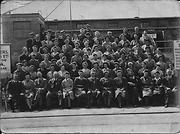 Donated by Elizabeth Knight
Donated by Elizabeth KnightTaken around 1941, the image shows a group of ammunition workers at Aycliffe. Among them on the second row from the front second left is Elizabeth Elder. Like a number of people on the photo, she travelled daily from old Hartlepool railway station in Northgate to the factory.
More detail » Anderson Shelter in Chatham Road
Anderson Shelter in Chatham Road
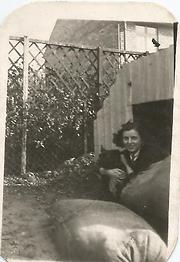 Donated by Frances Wilson
Donated by Frances WilsonDated 1942
Mavis Clarke with her dog in the garden of 71 Chatham Road in the Anderson shelter.
More detail » Anderson air raid shelter
Anderson air raid shelter
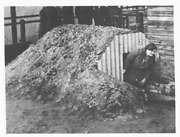 Donated by Douglas Ferriday
Donated by Douglas FerridayPart of the Hartlepool Library Service collection
Picture of an air raid shelter in Hartlepool, location unknown. This appears to be an Anderson Shelter which was essentially a tin box with earth piled up over the top of it.
HHT+N 443
More detail » Applegarth, James Douglas (2)
Applegarth, James Douglas (2)
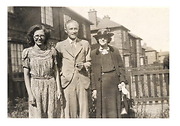 Created by unknown
Donated by Mr. Neil Wainwright
Created by unknown
Donated by Mr. Neil WainwrightJames Douglas Applegarth in the garden of No.176 Oxford Road, West Hartlepool, with his mother Frances Ellen (right), and sister Frances Emma "Tansy", possibly taken towards the end of WW2.
More detail » Auxiliary Fire Service
Auxiliary Fire Service
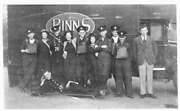 Donated by Douglas Ferriday
Donated by Douglas FerridayPart of the Hartlepool Library Service collection
Members of the Auxiliary Fire Service together with a make shift ambulance, A Binns delivery van.
HHT+N 52
More detail » Auxiliary Fire Service Section D
Auxiliary Fire Service Section D
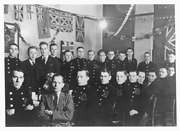 Donated by Douglas Ferriday
Donated by Douglas FerridayPart of the Hartlepool Library Service collection
Section D of the Auxiliary Fire Service enjoying a social evening by the look of beer bottles on the table.
More detail » Auxiliary Fire Service exercise
Auxiliary Fire Service exercise
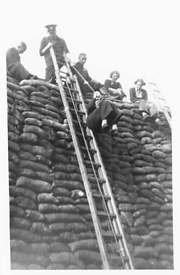 Donated by Douglas Ferriday
Donated by Douglas FerridayPart of the Hartlepool Library Service collection
 Aycliffe Munitions Factory by Frank Butterfield
Aycliffe Munitions Factory by Frank Butterfield
In 2005 Hartlepool's Museum and Library Services worked together on a project called 'Their Past, Your Future', which commemorated the part played by local people in the Second World War. As part of the project Frank Butterfield reminisced about his work in the Munitions Factory. This is his story, in his own words:
I was born on 29th March 1923 and I left school in 1937, so I was sixteen when war started. I had four brothers and two sisters, I was the oldest. I remember the night the war started, because everybody had their radios on. Me father sat there and me brothers; me brother thought it was very exciting, he started clapping – me father clipped him because he knew what was going to happen. Within an hour an aeroplane went right across the docks, we all panicked! I always remember that, and that was the night it started.
I was disabled, and they called me up and I had to go to Middlesbrough. They said “strip off, put your top coat on and queue up” and I said to the officer “what’s the point of me doing that?” he said “it doesn’t matter about that, just queue up.” He tested me, and he said “ you’re A1, all but your leg. You can fly an aeroplane.” But I was in engineering at the time, and they took all the men away and I was one of the few left, so they put me into different places. One of me jobs was at the dog track, I had to go and look after that. Funny show, that. And one time the government sent me to Newcastle, and said “you’re on war work”. I went into this place with this officer-type, and I had to sign this declaration “you’re under the Intelligence, now”. Intelligence! I was getting plans, and I had to draw this on a plan and make it – right to this day I never knew what was going on. I tried all sorts to find out what it was for. Some said it was the Queen Mary, she’d broke down and they didn’t want you to know where it was because the submarines were always after it.
This one morning a young chap was sat at my desk, so I sat against him, and I could see he certainly wasn’t in our class. I got rather friendly with him, and it turned out he was Lord Lambton’s son, the Right Honourable Tony Lambton. What a bloke! He wouldn’t go to the canteen for anything to eat. And, you know, then you’d travel miles to get an orange or anything like that. This Butler or something used to fetch a basket in – bottles of lager I’d never seen; there was all sorts of stuff! We had to fill forms in for the Government, Employment Cards and that. He hadn’t a clue, so I used to do all that for him. One time he said he was going away for a weekend shooting, so we went to this menswear shop and he bought some clothes and he said “you have some.” So I got a Harris tweed jacket and a pair of trousers and I had them for years. But in Hartlepool, amongst the lads, and me in great big checks! Every ton of coal that came out of Durham, his family got sixpence off it. I used to argue politics with him. I was the biggest Socialist agitator in the town!
After that I went to the steelworks and I was machine-gunned! I worked in the laboratories and when they started the furnaces up we had to go and tell them if the temperatures were right for the slabs. I had to go early with the furnace men, about seven o’clock one night. A lovely night. Where I sat there was a big steel box where the boiler man kept his things, and me charts were all around that and then we heard the sirens go. I stood there looking down at the four furnaces I had to look after and I saw machine gun bullets coming all the way along the roof, and they were hitting the pipes and jumping off. I jumped in the box out the way.
I lived up Jesmond Road at the time, and we used to watch dogfights on a lunchtime, then you’d go round and pick shrapnel up. We built our Air Raid shelter at the bottom of the garden. Me dad was a real all-rounder, he could do anything. He had it all planked out and bunks in it, we had everything in it, it was beautiful. My mother was deaf and dumb, so if there was a raid she heard nothing, we had to take her in. She just died this March, aged 100. When you have a disability people always think you are inferior. With my mother being like that they thought she was an imbecile. Well, she was a seamstress and she was a wonderful gardener. Me father was the same. During the war we always had a smallholding, up on Cameron’s Bank. We missed fruit the most with the rationing, especially bananas. When they rationed cigarettes, you used to kill for that! My cousin’s father was in the workshops at Richardsons. You could go to him and he could get anything. He opened a cupboard and he had everything. Chocolate, you name it.
I had a cousin at Wingate and Sunday mornings I used to catch the bus at Cameron’s Bank to go up. It was snowing this morning when I got on the bus and this girl I knew called Ethel Lawson was sat there with this girl. I said hello and got talking. I used to go to the Rink for the dances and next time I went I was drunk and I pleaded with Doreen to marry her. She was the most wonderful girl. We got married in 1944, just as the war was finishing. My sister was in the army and she’d married this bloke from Leeds. Our holidays came around so we went down to see our Mary. On the train on the way down I said “why don’t we get married and be done with it?” We’d been courting four year. She was twenty and I was twenty-two. We got a special licence down there and got married and went to Lewis’ Stores for a breakfast. She sent telegrams to her family. We were married 61 years before she died.
After we got married I was sent to the Munitions Factory at Aycliffe, on specialised checking bomb heads. We got some American ones that we’d never seen before so I had to check them out. They had a plastic head on – well we’d never seen plastic on big shells so we cut through and bang! Blew us straight through the blinking door! But at Aycliffe they built the wooden sheds with very thin wood and they piled the soil right round them so when they blew up it went straight up. Mind, the money was good. There were eight factories in one there and I had to go round and take a selection of all the things and examine them and see if they were all right. Women always got the delicate work so me wife was put on detonators. It was damned dangerous. If one fell everything stopped and they had to get it in a bucket of water. I went and told them she was expecting so they took her off it and for the rest of the time she sat and tore paper up.
It was a massive place. People worked there from all over the area and came on the train every day. You could see the bombers going round but they never found it ‘cos they tell me from the height it just looked like mounds of grass. There was a canteen as long as a street and they had eight railway stations. There was Groups One to Eight and there was nearly a mile between each group. There were divisions I knew nothing about – they didn’t seem to have nothing to do with bombs. I was attached to number Three with my wife. The girls were known as the “Yellow Canaries” because of the Cordite. Some of the girls turned bright yellow, their hair was green with the powder. It caused abscesses and some of the girls’ faces that had got caught in an explosion… These girls, they had presses, and what they did, they get the fuses and they pack them with powder, then they pull a lever and tighten it. You had special rubber shoes and special clothes and you had to keep your wedding ring wrapped up. It got all over the place that powder, very dangerous. You were forever cleaning because it settles all over, and the slightest thing and that was it. Very dangerous. There were explosions all the time, they used to keep a lot of it quiet. We were known as the “suicide squad”. But we got used to it and thought nothing of it.
My father was dead against the war and when he joined up I couldn’t understand it. He said “I’m there to protect me family, not the country”. But he’d been an engine driver all his life and they told him that we’d have to go and live at Liverpool. But they were getting bombed so he decided to go and join the RAF. First they sent him up on an aeroplane – he didn’t want to go up there! So he ended up as the keep fit trainer on the regiment. At the end of the war he was Air Field Controller at Thornaby. My cousin was my age and every time me dad was home he’d come, ‘cos he wanted to go and be a Pilot Officer. Me dad used to say “don’t, son, they don’t last no time, shot to pieces.” However, he got in – Pilot Officer – two flights over Hamburg and gone – just blown out the sky. Awful.
My youngest uncle, he was Regular Army, Royal Scots, he went to Palestine in 1937, he got blew up there then he came home for the war and was over in Dunkirk. He got out of Dunkirk just in a pair of white shorts. He was a good swimmer and he swam out to a boat and got home. Then they pushed him on a train and he came all the way up to the north just like that and he come to our house. What a state he was in. He had to go to his barracks up in Scotland and I think me dad give him some clothes. Then he come on his leave and he said “ oh, they’re giving us a rest, they’re going to send us to Hong Kong.” 1941. Well, you know what happened there – the Japs. When he was captured they put him on that railway line in Burma and from what I can make out he had dysentery and goodness knows what. And that’s where he died. He was a lovely chap.
More detail »
 Aycliffe Munitions Factory by Nancy Noble (nee Borthwick)
Aycliffe Munitions Factory by Nancy Noble (nee Borthwick)
In 2005 Hartlepool's Museum and Library Services worked together on a project called 'Their Past, Your Future', which commemorated the part played by local people in the Second World War. As part of the project Nancy Noble reminisced about her work at the Munitions Factory. This is her story, as told to a project volunteer:
Nancy began her working life when she was 18 at Aycliffe Munitions Factory (R.O.F).
An early bus picked up passengers at stops from Wingate to the Hartlepools; Nancy was picked up from Hartley Crescent in West View. On arrival at the factory shoes, outer clothing and jewellery were removed and placed in lockers. White suits, turbans and shoes were provided and before beginning the shift the women were inspected for safety purposes.
Nancy’s Group 5 worked at a long bench. The women rattled rifle shells to ensure they were empty, the empty shells dropped through on to a tray and were filled with cordite and sealed with shellac. This procedure ensured empty shells were not sealed. Because of the constant handling of the chemicals the woman became coated with a dusting of yellow and were known as the Yellow Canaries.
Because of the working conditions, long hours spent in underground huts (the only windows being in the canteen) and the handling of the cordite and shellac Nancy broke out in abscesses and was hospitalised for a year, returning to work when her health improved. At all times she remembers the happy spirit among the women, singing along to Workers Playtime and proud to be part of the war effort, making life long friends.
Nancy was married at Holy Trinity Church, Hartlepool in 1944. Kind neighbours contributed their rations towards a 3-tiered cake and in the age-old tradition Nancy borrowed from a friend a beautiful beaded wedding dress made in France. There was a reception held in the Co-op Hall and on the stage Ronnie Robson provided the music.
Nancy’s husband was exempt from war service, working at Richardson & Westgarths, and was part of the Heugh Battery Homeguard.
More detail » Aycliffe Munitions Factory by Sheila Chambers (nee Noble)
Aycliffe Munitions Factory by Sheila Chambers (nee Noble)
In 2005 Hartlepool's Museum and Library Services worked together on a project called 'Their Past, Your Future', which commemorated the part played by local people in the Second World War. As part of the project Sheila Chambers reminisced about her work at the Munitions Factory. This is her story, as told to a project volunteer:
Working at Aycliffe Munitions Factory, Sheila was one of the women in Group 1 which was known as the ‘Suicide Squad’, handling detonators and magazines. There were many accidents.
The conditions and nature of the work meant that there was always a fine layer of yellow dust comprised of combustible material (T.N.T.) floating in the air, coating everything including the women. For safety’s sake it was important to keep the T.N.T. damp, even a dropped component could cause a spark that could ignite the dust. The women became known as the ‘Yellow Canaries’. Sheila seemed to have avoided most of the staining by following her mothers advice; cleaning her face and neck with a saucer of milk on her arrival home each day. Her mother also made meat pies for her to take to work. The canteen staff would heat them up for her.
An incident still vivid in Sheila’s memory is of an early morning shift. She was making her way to the railway station, walking through the dark, eerie silence, no lights allowed, it was black out, she had not gone far, (she lived in Hanover Street, close to the Cenotaph and old Army Barracks) when out of the damp mist came a large silhouette of a man, she was terrified, as he was carrying a rifle. As he came closer she realised it was a Soldier, he explained he was on guard duty from the barracks and that she was all right.
Other memories of her time at Aycliffe, 1942-1945, are of the friends she made, Vera Jones, Doris Mason, Kathy and Mary (she has forgotten their surnames) and Twinkle (she never did know her surname), but remembers her with affection.
After the war Sheila had several jobs, but best of all she enjoyed her time working in the NAAFI at Catterick serving the men and their wives stationed there.
She married in 1951 (her husband an ex Commando) and moved to Melksham in Wiltshire.
More detail » Barrage Balloons
Barrage Balloons
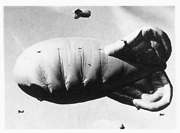 Donated by Douglas Ferriday
Donated by Douglas FerridayPart of the Hartlepool Library Service collection
Barrage balloons over Hartlepool during the Second World War.
More detail » Blackout by Ted Bage
Blackout by Ted Bage
In 2005 Hartlepool's Museum and Library Services worked together on a project called 'Their Past, Your Future', which commemorated the part played by local people in the Second World War. As part of the project Ted Bage from the 'Writing Together' group reminisced about his experiences as a child during the War. This is his story, in his own words:
Try and imagine if you can, the street, road, avenue that you live in. Now, try and imagine that same street at night time – you have street lights, every twenty or thirty yards apart, all lit up, lights shining from shop windows, house windows, the moon, passing cars, buses, in fact, in your street you can see from one end of the street to the other.
It will take a very vivid imagination to get a picture of what your street would look like in the war of World War Two. Just think no moonlight, no lights on your street, no lights from anywhere, the full town in blackness. You couldn’t see a hand in front of you, you had lights inside your house but you also had to make sure that it didn’t shine through your window. The window had a big black curtain put on them or anything else that would keep out the light from showing outside. If the slightest chink could be seen, a policeman or an Air Raid Warden would make sure you got it covered.
As soon as an air raid siren sounded, the lights in every part of the town were put out; outside of your house and street, it was a complete blackout. Air raids could last for hours and it wasn’t until the all-clear siren sounded that the lights came back on.
No matter how long you had lived in the street and you thought you knew every nook and cranny – once you had a complete blackout you were in another world. Sometimes, during an air raid you would get a quiet period; that was the time your mother would ask you to go to the fishy and you had to take your own paper, “no paper, no chips.” It was nerve wracking going down the street; sometimes you heard footsteps behind you – it made your hair stand on end; and lamp posts – we were always bumping into them. Believe me, in the black out your street became another world.
More detail » Bomb damage at the Greyhound Stadium
Bomb damage at the Greyhound Stadium
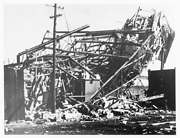 Donated by Douglas Ferriday
Donated by Douglas FerridayPart of the Hartlepool Library Service collection
Picture showing bomb damage at the Greyhound Stadium, Clarence Road, Hartlepool
More detail » Bomb damage in Brenda Road
Bomb damage in Brenda Road
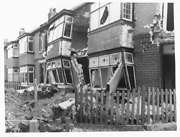 Donated by Douglas Ferriday
Donated by Douglas FerridayPart of the Hartlepool Library Service collection
 Brenda Road Bomb Damage
Brenda Road Bomb Damage
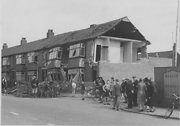 Donated by Hartlepool Museum Service
Donated by Hartlepool Museum ServiceDestruction caused by a bomb drooped during an air raid in August 1940. Some of the children seem more interested in the camera man!
More detail » Browns Sawmills Bomb Damage (1)
Browns Sawmills Bomb Damage (1)
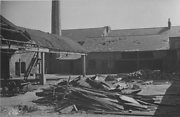 Donated by Hartlepool Museum Service
Donated by Hartlepool Museum ServiceDated 1940
John & T. Tiplady Brown's Sawmills on Stockton St. from inside yard after being hit.
More detail » Browns Sawmills Bomb Damage (2)
Browns Sawmills Bomb Damage (2)
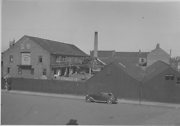 Donated by Hartlepool Museum Service
Donated by Hartlepool Museum ServiceLooking across to John & T. Tiplady Brown's Joinery works & sawmills after bomb damage. The tip of Christchurch can just be seen in the background
More detail » Captured German Aircraft
Captured German Aircraft
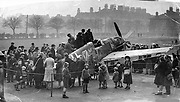 Donated by Mr. J. Cambridge
Donated by Mr. J. CambridgeDated 1940
A captured German Messerschmitt Bf109 on the Bull Field, probaly in late 1940.
It is belived the plane, flown by Gefr. Hubert Rungen, was shot down by a Spitfire from 92 Squadron in October 1940, and crashed at Cuckold Coombe, near Ashford in Kent. The aircraft was put on display at the Guildhall, London, Hartlepool and Durham.
 Central Hotel Bomb Damage
Central Hotel Bomb Damage
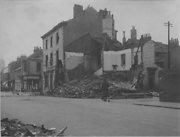 Created by F.C. Huntley
Donated by Hartlepool Museum Service
Created by F.C. Huntley
Donated by Hartlepool Museum ServiceDated 1940
Central Hotel on the corner of Musgrave & Brunswick Streets after it was hit during the air raid on 20 August 1940.
HHT&N 47
More detail » Church Street Bomb Damage
Church Street Bomb Damage
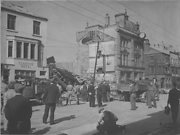 Donated by Hartlepool Museum Service
Donated by Hartlepool Museum ServiceDated 1940
Surveying the damage caused during an air raid at 12.50am on 28 August 1940. The premises of Edgar Phillips was completely destroyed & the Clarence Hotel & Yorkshire Penny Bank were later demolished because of structural damage. Three people were killed in the blast.
HHT+N 48
More detail » Church Street Bomb Damage
Church Street Bomb Damage
 Donated by Hartlepool Museum Service
Donated by Hartlepool Museum ServiceDated 1940
The exposed wall of the Yorkshire Penny Bank after the air raid on 28 August 1940 destroyed Edgar Phillips' shop premises. All that remains of the flats that were above the shop are a picture on one level & a fireplace with a mirror above on the top level. Note the soldier with his bayonet on the roof.
More detail » Church Street Bomb Damage
Church Street Bomb Damage
 Donated by Hartlepool Museum Service
Donated by Hartlepool Museum ServiceDamage to Yorkshire Penny Bank's clock which stopped at the time of the air raid in August 1940 which destroyed the Edgar Phillips' shop premises next door.
More detail » Church Street bomb damage
Church Street bomb damage
 Donated by Douglas Ferriday
Donated by Douglas FerridayPart of the Hartlepool Library Service collection
Church Street, Hartlepool showing bomb damage caused to the Edgar Phillips building next to the Yorkshire Penny Bank. Three people were killed in the blast.
HHT+N 49
More detail » Civil Defence Mobile Canteen
Civil Defence Mobile Canteen
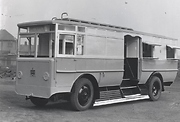 Donated by Douglas Ferriday
Donated by Douglas FerridayPart of the Hartlepool Library Service collection
A West Hartlepool Corporation Mobile Canteen for use by the Civil Defence. This photograph was probably taken during the Second World War, as the running boards and leading edges of the interior steps have been painted white. Although the body looks grey, it was in fact painted pale blue and cream. As this is a converted trolley bus with no power poles, it had to be towed to wherever it was needed.
More detail » Civil Defence messengers
Civil Defence messengers
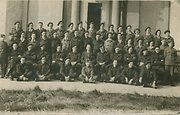 Donated by Hartlepool Museum Service
Donated by Hartlepool Museum ServiceCivil Defence messengers outside Sir William Gray House, the museum.
More detail » Civil Defence on exercises
Civil Defence on exercises
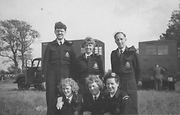 Donated by Mrs. Violet Butcher
Donated by Mrs. Violet ButcherHartlepool often played host to other Civil Defence units, one of the exercises being to practice catering for large numbers of people at any one time. Joan Forstad is on the front row, far right.
More detail » Demolition of Community Air Raid Shelter (1)
Demolition of Community Air Raid Shelter (1)
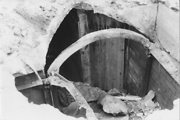 Donated by Hartlepool Museum Service
Donated by Hartlepool Museum ServicePartly demolished shelter in Marine Drive showing a section of the steel frame.
More detail » Demolition of Community Air Raid Shelter (2)
Demolition of Community Air Raid Shelter (2)
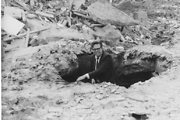 Donated by Hartlepool Museum Service
Donated by Hartlepool Museum ServiceA man is standing in what would have been the roof of the shelter on Marine Drive.
More detail » Demolition of an air raid shelter
Demolition of an air raid shelter
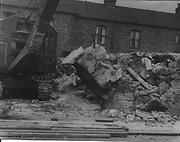 Part of the Library collection collection
Part of the Library collection collectionDated 1946
Unknown place but named demolition of surface air raid shelter and dated 1946. It could be the Church Street area of Hartlepool as it does say Barclays Bank although the reference to Barclays could well be a note about something else.
HHT+N 90
More detail » Doing My Bit at the Steelworks by Mary Forcer
Doing My Bit at the Steelworks by Mary Forcer
In 2005 Hartlepool's Museum and Library Services worked together on a project called 'Their Past, Your Future', which commemorated the part played by local people in the Second World War. As part of the project Mary Forcer reminisced about her time doing 'man's work' on the Home Front. This is her story, in her own words:
I was born on the second of August 1921 in Hartlepool, and I’ve lived in Hartlepool all my life. I was eighteen when war broke out.
As it happened we moved into a brand new house on the Saturday and the war broke out on the Sunday. We moved into a house with a garden and a bathroom and an indoor toilet with hot and cold water, now they were the exception – those houses. People lived in back to back houses where probably three and four families in one house shared a toilet, you had no bath, you had to heat all water on the kitchen fire and took it in turns to get a bath. The water wasn’t tipped out, it was just hotted up and the next one went in it.
I had three brothers who were in the forces and they had to go away. One was in the Marines, one was in the Navy and one was in the Army. We had no father. My mother brought us up and as soon as we could we got a job to bring money onto the house. So people like my mother were poor to start with. People nowadays have no idea how poor people were. So she was still poor because for all the boys had grown up they had to go into the forces, and they got married well before the war finished, and never came back there. Families seemed to be more united than they are now. You were close to your brothers and sisters in those days, but they had to go away and that was it. So I was left in the house with my mother and she was an invalid and I had to get a job so I could look after her.
First of all I got a job on a furnace and it was to make bullet-proof steel for the tanks, and there was graphs on the wall and wheels and you went round and had to keep that temperature all the way round the furnace to a certain height. It hadn’t got to get too hot or cold. It had to be kept at that height till they withdrew the ingots. Well it was a bit boring that. It was more money and more interesting driving a crane. This one was a sort of trolley on wheels and you had to climb up into the roof and it just slid along a girder just like a railway truck would do. It was a magnet and it picked five tons of steel up at a time, and I had to load it into the wagons and it would go away to the factories to be turned into tanks or munitions or whatever. The crane I worked on mostly was inside. I’ve worked on one outside and it was just picking scrap up and loading wagons with plates. It would probably pick about three plates up at a time and you had to switch the magnet on and off so only one plate fell off at a time so the inspector could look at them and see if there was any faults in the steel. The faulty ones went to one side to be done again and the good ones had to be loaded into the railway wagon. The steelworks had its own railway system then. An engine used to come in one side of the dock, loaded up and went out on the other side to the railway sidings and then it would connect to a train going to Midlands or whatever where the munitions were made.
We were on three shifts. I worked six till two, two till ten, ten till six. If you worked six till two and a two till ten driver didn’t come out you had to stop behind and do their job. But those cranes were in continual use twenty-four hours a day. They had to be manned.
Normally if the war hadn’t been on men would have done these jobs. Women didn’t work in the steelworks, only in the offices. It was a man’s job working in the steelworks. Well, the men were called up or they volunteered so there was a shortage of men. The women had to go in and do the jobs. Women couldn’t do all the jobs in a steelworks, some were “reserved occupation”. You didn’t work on open furnaces and tipping the steel out. You did the jobs that young boys would have done. We were labourers. We didn’t have particular skill, you just had to use a bit of common sense, that was all. So really you were releasing men who weren’t on the “reserved occupation” to go either on to other jobs that women couldn’t do or to go into the forces. Where they could the women took over from the men to release them for the armed forces.
When the air raid sirens went off everybody could leave their jobs and go in the air raid shelters, but when I was on the one with the bullet-proof steel I couldn’t leave it because you had to stay and monitor that furnace, and it was in pitch dark and I was horrified of mice. I wasn’t frightened of the air raid so much, I was horrified of mice. But on the crane you couldn’t work because you were in darkness and you had to go and take shelter. Say you came off at six o’clock in the morning, you asked people coming into work was there any bombs dropped and whereabouts and what damage. And I came off one morning and somebody said that a land mine had dropped on West View, and that’s where I lived, and I had to run. There was no buses. I had to run all the way from the steelworks, which was right at the top of Lynn Street, all the way to West View till I came to an air raid shelter where the wardens was on duty and I went in and asked what happened. And they said “oh, there was no damage done.” It had just fallen into a field at Hart village so nobody was hurt. We didn’t have a shelter at home. You got this corrugated thing to make an air raid shelter of, and there was only my mother, who was an invalid, and me – eighteen years old. I couldn’t dig a hole in the garden to put an air raid shelter in. So we just stayed in the house.
When I see a bunch of bananas I think how my mother would have loved it if we’d said to her “here’s a banana.” It would have been like giving her something really valuable. A banana was out of this world. There was nothing in the shops to look at. You couldn’t say “oh I’ll buy that if I have the money.” They weren’t in the shops. So now I think “ooh a big cream cake”, and I can put as much butter on the bread as I want and I can be extravagant, and that reminds me of the war more than anything. You missed butter. It was like you scraped it on and you scraped it off, and the thing was we didn’t have any refrigerators in those days so mine didn’t get the chance to go bad. If you ate it all, well that was it. You just had to share. You could get vegetables, they weren’t rationed, so if you knew somebody who had an allotment or a garden they would probably give you a cabbage or onion or something like that. We survived the rationing and we were rationed for a long time after the war so we obviously got used to it.
On VE-Day everybody just went mad. All the church bells were ringing and everybody was out on the street singing and if you saw somebody in uniform people were throwing their arms round them and just generally dancing and singing in the street. But of course, for a lot of people there was heartache because the people where they lived weren’t coming back home, and then, of course, there was the thought that the prisoners of war would be coming home. I think the German prisoners of war were allowed to get in touch with their relatives through the Red Cross, but people in Japanese hands, they didn’t know whether they were dead or alive.
My three brothers came back all right. One was in the Far East, but he came home all right, and one was in the Navy and the one in the Army was just stationed in England. So really, ours wasn’t a bad war like some people had. We were optimistic that things would get better. But for all the men trained to kill with bayonets and things I think life is more dangerous on the streets now than in 1945 when all the servicemen came home, because they’d had enough of war and fighting. After the First World War they said that would be the war to end all wars, and I would have hoped that the Second World War would have definitely been the war to end wars. But history doesn’t prove that does it? Somebody is at war somewhere all over the world. You saw great cities destroyed. London was burning and cities in Germany and Poland, Warsaw. All over the place, places were destroyed, and it seems that people never get tired of causing wars.
More detail » Doing My Bit in the St John's Ambulance Brigade
Doing My Bit in the St John's Ambulance Brigade
In 2005 Hartlepool's Museum and Library Services worked together on a project called 'Their Past, Your Future', which commemorated the part played by local people in the Second World War. As part of the project a lady (who preferred not to giver her name) reminisced about her time 'doing her bit' on the Home Front. This is her story, in her own words:
I was born on 25th September 1918 in Norton-on-Tees. In 1938 I was a clerk in the Medical Officer of Health’s Department, and, of course, with war looming our department set up First Aid courses to train people to be ready. My job was to go round to the various classes and take the roll call to see who was there. And, of course, the first thing that happened, the teacher in the First Aid class said “this is a triangular bandage. This is the base and this is the apex”, and I thought I’d better find out what happens between the base and the apex. If I was going to do it I might as well do it properly, so I joined St John’s Ambulance Brigade. Took my own First Aid course and qualified on the 1st January 1940. At that time the St John’s Ambulance Brigade was in four parts. There was the men’s division, the ambulance division, the nursing division, the boy cadets and the girl cadets. By that time I had taken all my exams and I had taken my Lay Instructor’s Certificate as well. I couldn’t teach, we had to have a doctor or a state registered nurse for the sort of upper things, but the lay instructors could teach them the basics. And over the years I moved up from an ordinary nursing sister till I became the Area Vice President. I served for fifty years or thereabouts.
War broke out in September 1939. We were on holiday in America, in New York. It was the year of the World’s Fair, and that was what we had principally gone for. Then when Czechoslovakia was invaded we decided we had better come home. So we came home earlier than we intended and we came back in the Aquitania. I think this was the sister ship of the Lusitania that was torpedoed and sunk in the North Atlantic. We were on board when war was declared, and the Cabin Class invited the Tourist Class up for a dance. So we celebrated instead of getting frightened. Well I mean, what was the good in getting frightened?
So I returned to work in the Medical Officer of Health Department and we set up First Aid posts and ambulance stations. Our fleet of ambulances were Co-op laundry vans! By this time we were living in Yarm, and in addition to being a member of St John’s I joined the National Hospital Service Reserve, which was a reserve of doctors, nurses, First Aiders, anybody who could help in an emergency. And I was only called out once, and it was to go in the middle of the night to Wynyard Station, where they were expecting a train to stop full of casualties and we were wanted to go and help. So we went to Wolviston and the train steamed straight through and never stopped, which was very fortunate because the casualties were not as many and not as serious as had been expected.
I used to go down to man a telephone at the report centre when there was a raid. I got what was called a yellow message which certain people got to call them out before the sirens went. I got a yellow message and I was in Norton Road in Stockton when the sirens went, and I was in an open car at the time and I got out and put the hood up. What good that would have done I really don’t know. But it was the sort of instinctive reaction to bombs falling and guns going off. But the girl who was manning the telephone next to me took a message, and she was a farmer’s daughter and it was their own farm that had been hit, and fortunately there were no casualties, but that was certainly a shaker for her. We had quite a scare on one occasion when the sirens went and we thought that parachutists were coming down. I asked my parents a rather silly question which was “how would they tell us when it was all clear?” They having lived through the First War couldn’t give me an answer because they would know very nicely that an invasion could be jolly serious and we might never get the all clear. However it was a false alarm, it wasn’t German parachutists.
I wasn’t in the St John’s Ambulance Brigade full time, just as often as I could go when I was not at work. But I had applied for a job in Hartlepool in the Ministry of Labour, which I got. My main job was registering and interviewing people as to whether or not they could be called up or whatever they could do. And it was a “reserved occupation” so I wasn’t able to volunteer for anything further. So the only active thing I did was go potato picking for a week, which was rather funny because it rained every day and I didn’t pick many potatoes. We had long hours at the Ministry of Labour and we only had three quarters of an hour for lunch and we only had about ten minutes at ten o’clock where we could get a coffee, and my desk was miles away from the canteen so I used to have to take a thermos. And on Saturdays we had registrations where we registered everybody between the ages of eighteen and sixty, and then after that they were called up to be interviewed. I worked so many days in Hartlepool and then I also had to go to Horden and Blackhall for a day a week.
Everything was rationed and we were all encouraged to dig up our gardens, if we had them, and plant food of all sorts. Where we lived at Yarm we had two orchards and we used to have a good apple crop. We also had hens. There were three of us in this house in Hartlepool registered for rations. It used to be delivered and as we were all out at work it used to be left on a pair of steps in the back yard so when we came in from work we had to wipe the flies off the meat before we could cook it. Sugar, bread, everything was rationed, and I think perhaps fish, with Hartlepool being a port, was the easiest thing to get. Bacon, we used to get about one rasher. If you used your lard ration to grease the tray you had got nothing to cook with! And that was about the amount you got. It was ridiculously small. We just learnt to do without. I think we were a lot fitter than we were later.
I married a Hartlepool man, and my husband was in the Auxiliary Fire Service and then he transferred to the Home Guard, and they used to have a camp every summer and I can remember him going on exercises. He was a Weapons Training Officer and they had a firing range somewhere halfway on the way to Elwick behind a farm. After they had finished their practice he was to bring all the unspent ammunition back and put it in a cupboard in the hall. Well, finally when the war did end all this ammunition was in our cupboard, and we thought “what on earth are we going to do with it?” Anyway the police had an amnesty that if anybody had any weapons or things like that they were going to take it in. So he knew when they were not on duty and he took the whole lot and left it on the doorstep of the police. So that got rid of that.
Petrol, of course, was rationed for a long time so we couldn’t use the car. But I remember on VE-Day we had a little open Morris and a limited amount of petrol and my husband and myself went to Osmotherley to a little pub that we used to know up there for a drink. But my mother didn’t celebrate VE-Day very much because, I think, she was worrying that my brother was still on active service in the West African Frontier Force. As it happened he was repatriated quite late in 1945.
More detail » Early Wartime Memories by David Willis
Early Wartime Memories by David Willis
David Willis no longer lives in the town but has kindly sent in his reminiscences of a Wartime childhood in Hartlepool.
In the late 1930s I remember the visit of the 'chocolate train', which was parked up in a dead end platform at the east end of West Hartlepool Station. The whole train was decked out in colours which from memory resembled the Cadbury colours. I made several visits as samples of various chocolates were on display and were given away to hungry kids like me. I wonder if anyone else remembers the 'chocolate train', which left many very sad small people as it finally pulled out of the station.
The other major event was the spectacular burning down of Dyke House Farm and its surrounding buildings, which I think must have been organised by the Fire Brigade, as I distinctly remember Firemen silhouetted against the flames as the fire took hold. There was also an accompanying firework display. It seemed to me that most of the town must be in attendance as we looked on from Wharton Terrace. This was prior to the house-building on the site and also that of Dyke House School, which never got beyond the foundation stage before the onset of the War, but provided a magnificent playground for children.
With regard to St Oswald Street itself, it had its own garrison of troops, stationed in a building at the Raby Road end of the street. The building was Waugh's Bakery and the soldiers were from a Scottish regiment resplendent in their kilts. Each evening a lone piper would march up and down the street. The soldiers used a large sliding door in Wharton Terrace backlane to access the building and a well-known tramp could often be seen near this door looking for scraps of food. One day the soldiers put him in a barrel of water and scrubbed him clean. Waugh's also had a cake and bread shop immediately opposite the bakery. In addition there was a further shop at the other end of the street, known as McGhees general store.
Prewar the United Bus Company had a garage on Raby Road immediately opposite St Oswald's Street which was taken over as a Fire Station for the duration, housing several large engines.
In the early years of the War, Brougham School was taken over by the army. Many of the pupils spent the next 3 or 4 years getting a part-time education in houses. For example, a group of pupils from the St Oswald Street/Chester Road area met for about three half-days a week in my parent's house (12 St Oswald's Street), next door at number 10, or at a house at the Raby Road end of Chester Road.
When Dyke House opened we resumed full time education there and I can remember growing vegetables in the quadrangles in the 'Dig for Victory' campaign. I was there for 1 or 2 years and my teacher was Miss Salt. I took the 11 plus at Dyke House before moving on to West Hartlepool Grammar School in September 1945.
Just postwar I joined the youth club run by Westbourne Church between Stranton and the Burn Valley. We had a very successful football team, playing as far afield as Darlington and Sunderland. We were known as the Guild of Youth, a future well known team member being Brian London who fought Mohammed Ali for the World Heavyweight title. I was at the Grammar School at the time, a bastion of rugby, where the Headmaster insisted on boys playing rugby in winter if they wished to play cricket in summer, which I loved. This led to all sorts of rushing journeys between morning rugby matches and afternoon soccer games, especially if these were 20 miles apart.
More detail » Elwick Road School Staff Cricket Team
Elwick Road School Staff Cricket Team
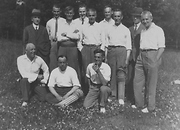 Donated by Mr. John Watson
Donated by Mr. John WatsonDated 1940
Teachers from Elwick Road Senior Boys School making up a team in 1940.
More detail » End of sweet rationing
End of sweet rationing
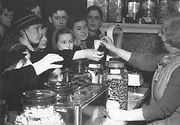 Created by NDM
Donated by Hartlepool Museum Service
Created by NDM
Donated by Hartlepool Museum ServiceDated 1953
On February 5th 1953, this West Hartlepool shop along with others all over the UK was inundated with children buying sweets as rationing had ended.
It is most likely that the shop is 'top shop' in Elwick Road on the corner of Powell Street and the shopkeeper Mrs Armes.
More detail » Evacuation by Joan Ralton
Evacuation by Joan Ralton
In 2005 Hartlepool's Museum and Library Services worked together on a project called 'Their Past, Your Future', which commemorated the part played by local people in the Second World War. As part of the project Joan Ralton reminisced about her childhood and being evacuated. This is her story, in her own words:
I was seven when war broke out. At that time we lived in 29 Colwyn Road. There was my brother and myself and both my parents. My dad was a fitter at Head Wrightson’s in Brenda Road, which was a reserved occupation, then he went on to work for the army, but I can’t remember what he was doing.
I remember it was my birthday on the 22nd of September and I remember saying to me mam “am I going to get a birthday present now Hitler’s coming?” and she said “well, it all depends whether Hitler gets here or not.” I was at Lister Street School and it must have only been a week, two weeks after war was declared that we were sent on this rickety old bus to Mulgrave Castle at Lythe near Whitby. To us it was a big adventure but I felt safe because my mam was coming with us as well. There was three mothers went with all these kids from Lister Street. A lot of them were a lot poorer than I was, so they were probably a bit more independent than me and my brother was. So to them it was like fairyland, obviously. We got to this magnificent place, this lovely castle. I think the biggest thing that impressed me was with having the old tin bath hanging on the wall at home, and Friday night that tin bath used to come in the back kitchen and then to see this magnificent big bathroom, this big white bath which had got a dozen people in, I think. It was beautiful. We stopped in one side of the castle, we didn’t venture. Mind, we did explore, sometimes. But the Marchioness of Normanby and her secretary were on the other side. I believe the Marchioness’ son was taken prisoner very early in the war - she was always in black, a very regal lady. She didn’t mix with us a lot but now and again she used to go past and pat me on the head. We slept in the chapel. We all had our little camp beds. Unlucky me, there was the alter with the big white cloth on, and I got the camp bed next to the alter. Considering I was only seven, I was horrified of the alter, and I used to cry myself to sleep every night and all the kids used to say “there’s ghosts in there! There’s dead bodies underneath that white cloth!” Which was very unfair and I was really frightened, but I got used to it after a while. And little Tupper who perpetually wet the bed! And he did get into trouble for that but he was only about six.
A lot of the kids didn’t really get homesick ‘cos to them it was a big treat. But my mam stopped three weeks and I think that was worse than being left straight away because I remember trying to catch up with the bus that was taking her away, and crying, and saying “ come back, mam!” but she had to go home for me dad, you see. For the first three weeks that mam was there, she looked after us. But in the castle we had the butlers in lovely black suits with silver buttons on; the maids, who were dressed up with the white caps on and the black aprons. Personally, I think they hated us! But they looked after us. And there was the secretary, Miss O’Brien, who was a lovely lady. I always remember she took me down to the forest one day. She said “we’ll go for a walk and get some food”. In my little mind I thought “how can you get food in a forest?” And we came to this big wooden trap door and she said “follow me down the steps” and of course, obviously in them days there was no fridges, so down we went and it was icy cold down there. She said “this is the larder”. There was all this food down there. Joints of meat and tins, loads of food. She put all this stuff in a big basket and give me a little basket to carry. She said “we’ve got to take this back to the castle now, for the cooks”. It was the kind of food we didn’t get at home. I remember all of us sat at this big table and we got cornflakes or porridge but mam was sitting next to me and she got bacon and egg. And I used to say to her “can I have a bit of bacon?” and she would say “we’ll have to wait until nobody’s watching” and then she used to slide me a bit of bread with some bacon on underneath the table because that was only for the grownups.
And then the winter came and it got colder and colder. We had a little cloakroom to put our coats and wellies in and there was always a big charge to get the wellies. And I always got left with the odd one. There was always one wellie that didn’t have another one to it. And I remember saying “I want to go out and play in the snow!” John, the butler, he used to pick me up on his shoulders and run me round. And then one night we decided to explore. We knew there were certain parts of the castle we couldn’t go in, but we were getting bored so we explored. And we found this hall and there was a stage, so obvious it was a theatre that they must have used in years gone by. We crawled underneath and we found all these old-fashioned gowns and shields and things like that. And we used to go in the forest. The favourite occupation was conkers. There was big windows in the castle and we used to get up on a morning and we could see all these rabbits running around like something out of Walt Disney. We’d never seen anything like it in our lives. For schooling we went down Lythe bank – it’s horrendous! And for little legs! And we went to this little village school; we sat on benches. To the other kids we were like creatures from another world. They were country kids. I can’t remember too much…I don’t think we learnt very much. Then we all had to trudge back UP the bank! Christmas was lovely. The decorations were out and you had a special meal. Everybody was happy and even the Marchioness was there. I think I got a little doll with a bow on.
People were very good to us on the whole, but I was very homesick, especially when mam went, and I was just a skinny little kid. She used to write to us but it was difficult for her to get there. There was no car. She used to have to get a bus and it took an eternity to get there. And she didn’t have the money to come very often. I was there for about a year. I left first, I think. Shortly after that the soldiers took over so everybody was cleared out and the army went in and it was used as a training place. The Marchioness did her bit, but bye, I bet she was glad to get rid of us! So most of them came back home when the army moved in. The bombings were still going on, though. In Colwyn Road the bomb dropped and I think they killed one person and blinded the father. Oh, and then there was the gas masks! Oh, them gas masks! I still have claustrophobia – still! When that photograph was taken in the gas masks I was suffering (see gallery below - Joan is on the right of the Marchioness). And they used to have to literally force it on. And they used to have mock air raids. They used to blow a whistle. And when the whistle blew we all had to go down this long corridor and sit on each side and put our gas masks on. Well, they must have had a right tussle with me because I absolutely hated it. I can still remember the taste and the smell of the rubber. And ever since then I have had claustrophobia.
Rationing was very severe, but I was lucky ‘cos I never used to eat anything! I was such a skinny little kid, and food didn’t bother me, really. But I do remember when rationing ended. We used to make do with cocoa powder with sugar in and dip our fingers in – that was sweets for us. But it was in the market, and word got round they were selling jelly with peanuts in and it was sweet. So there must have been thousands of kids all hurtled down to the market and stood in a queue and it was LOVELY! And I used to like cans of egg powder. Mam used to make lovely omelettes with this egg powder. And we had this little duck in the garden, we called him Gander. Mam was feeding him religiously and he was getting fatter and fatter and he had the garden like a quagmire. He got the tatie peelings and a few odd carrots now and again. He was our friend. So it was getting near to Christmas and we came home from school one day and he was gone! Mam said “he’s dead, Joan, he was getting too fat and he just died.” I cried and me brother cried. So Christmas day dawned, and of course in them days if you got a chicken or anything else you were damned lucky. And here’s this lovely, brown…we thought it was chicken. It looked smashing! Then all of a sudden me mam started to cry. It must have twigged with us. I said “It’s Donald!” “Get it eat” me father said. And we couldn’t. Me dad ate the lot, ‘cos we didn’t want it. I found out later she’d got Mr Fountain, the butcher, to come up and wring his neck. Me mam must have cried through all the cooking of him. But it was all out of desperation, you see. I really don’t know how mam managed, now I look back. She always had a meal on the table. If there was a queue, it didn’t matter what it was for. Mam used to say “there’s a queue up there, get yourself up.” So we just used to stand there, at the end of the queue!
Mam used to fiddle the Black Market now and again and go and get some chocolate from a shop in Stockton Street. She had to pay over the odds – I don’t know where she got the money from. She once got a tin of salmon, that was a great treat. And I got a banana once, I always remember that. It was the first banana I’d seen and I didn’t know what it was. Mam said “it’s a banana. You take the skin off and you eat the inside.” I said “I don’t want to, I want to keep it.” So I took it to school and it was getting blacker and blacker and blacker. I passed it all around the ones who hadn’t got a banana… “I’ve got a banana!” I was like the Queen for a day! Actually it went on for two or three days and the banana got rotten. Mam said “you’ll have to eat it or I’ll put it in the bin.” I peeled it and it was solid black. I said “Is this the way it’s supposed to be?” She said “no, it’s rotten – now you haven’t had a banana!”
And it was an exciting time, the war, for us kids. I remember once, there was Brian Howard, my brother and me waiting round by Strathmore House at the bus stop and there was a wall behind us. And a great big RAF truck came round the corner. We found out later it was big steel ovens they had on it and one of them fell off. And you can imagine this great big huge oven hurtling towards us. And I remember me brother saying “jump, Joan, over the wall!” And poor Brian didn’t get over and it caught his leg. There were three young RAF lads and I remember them saying “oh, hell, we’re in for it now!” They took him to hospital – eh, we were lucky ‘cos if we hadn’t jumped over that wall we would have been killed. Brian had a badly cut leg. I was a very good cricketer - I used to play with the lads. And swinging round the lampposts. We used to tie a rope round the top and spin round. Our garden overlooked the Burn Valley so we used to climb over the wall and dodge the chap in charge with a stick. We were all terrified of him – a tall, thin bloke with a stick and he’d wallop you with it if you went on the grass. We used to go and catch tadpoles.
The air raid shelters were horrendous, really horrendous. Two men came round and dug the garden up and fitted this Anderson shelter in and they said “you’ll be quite safe now” and that was it. But oh, dear me how I hated it! Mam used to drag us out of bed and down we’d go among all the wet and the cold, because it was September when war broke out, so it was obvious the weather was bad. It was damp and it was cold and there was earywigs and snails, you name it, it was horrible. They put the shelters in just when the war started. There was one big rush for air raid shelters by people who had gardens. Then they built the big shelters further down the road, they were built of solid concrete, where people from the streets could go to.
As soon as the air raid siren had gone we all piled into the shelter. We were all frozen; there was no heating in there, we were all wrapped up in blankets. “I’m sick of this” my dad used to say. He used to go outside and shout and swear up at the searchlights. And if he saw a plane all Hell was let loose! As if he would have made any difference! And he was only a little man. The German planes used to perpetually go looking for ICI, but that was covered in darkness. They never got it. One night he was coming out of work at Head Wrightson’s, cycling along the road and they looked up and this German plane swooped down; he’d seen them, the swine! Next thing dad knew there was a rat-a-tat-tat and he was machine-gunning them! They all jumped off the bikes and jumped. Fortunately, there’s hedges along Brenda Road and they jumped into the hedges. The plane rat-a-tatted away all the way down the road, but he never shot anybody as far as I know. We got him when he went over the coast and shot him down. Dad was overjoyed about that, it made his night. He was puffing away on his tobacco saying “ha! You need shoot at us, you swine! It serves him right!” He was shooting at civilians! He spotted them and came down low. So he deserved to get shot down.
On VE-Day Auntie Maud, she was a dressmaker, she made me a suit with a funny hat. Everybody rallied round, it was a great occasion. Everybody was happy and we all got dressed up as best we could. That photograph was taken in Grassmere Street (see gallery below), but lots of streets had parties. All the mams’ made cakes if they could and sandwiches all on trestle tables. It was great but it was sort of an anticlimax, because even when the war finished we still couldn’t get much, things were still rationed for a long while. When I was about fifteen and the war had finished we used to go to Seaton a lot and on the beach there was all these men in these uniforms with a “V” on the back- they were prisoners of war. And they were clearing the beach of mines what had been put down. We were fascinated ‘cos they all seemed very handsome to us; they were young and most of them were very blond; they were Germans, some were Italians. Some of our lads were there watching them but they weren’t going to do anything, they were too busy concentrating whether they were going to stand on a mine. We used to talk to them from a distance. I talked to one of them and he said “yes, I fought in the war.” I said “yes, but you didn’t win, did you?” He said look, and he lifted his arm up and underneath was “SS”. He was only a young lad. There was a prisoner of war camp at Greatham near Sapper’s Corner and at Rift House. The Italians were up near Newton Bewley and we went up there to survey them. One of them said to me ”come here, little girl” I looked at him in terror but I toddled up to the wire and he gave me a bar of chocolate. Now I look back, I think how come you could get chocolate and we couldn’t get chocolate? But I daren’ t eat it in case it was poisoned so I took it home. I took it home and told my mam I got it from an Italian man….”It’s poisoned!” she said. She showed it to dad and he said “get it eat, there’s nowt wrong with it!” But they were just young lads most of them, and they were glad to be out of the war. I knew someone who married a German, who was a prisoner of war here.
Everybody was far more friendly in them days, I found. We just lived as best we could.
More detail » Evacuee Children
Evacuee Children
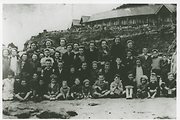 Donated by Hartlepool Museum Service
Donated by Hartlepool Museum ServiceChildren from Sacred Heart School with teachers in Scarborough having been evacuated.
More detail » Experiences of the Home Guard and Air Raids by Fred Williams
Experiences of the Home Guard and Air Raids by Fred Williams
In 2005 Hartlepool's Museum and Library Services worked together on a project called 'Their Past, Your Future', which commemorated the part played by local people in the Second World War. As part of the project Fred Williams reminisced about his memories of life on the Home Front. This is his story, in his own words:
I would call myself a veteran Home Guard, serving them when they were called the Local Defence Volunteers (L.D.V.), which some of us would jokingly call Look, Duck and Vanish! If German paratroops had dropped in after L.D.V. had just started to be organised, there might have been some truth in it! My first weapons were a pickaxe handle and a sporting shotgun. The Home Guard was my last resort. My employer, South Durham Steel & Iron Co., blocked any hopes I had of joining the army by claiming I was in their Reserved Occupation List, being semi-skilled. I volunteered for the Territorial Army thinking I might be able to get to the action in the war as some Terriers had been drafted in to support the army. “Get back to work!” I was told. The same applied even for the Civil Defence.
Different parts of the town had their own Home Guard units and headquarters, such as the South Durham Steelworks, the shipyards and other organisations. Most Home Guards had compulsory duties to perform, like fire watching at night and patrolling communication centres which could be miles apart, and be armed doing so. Then, amongst those duties, we had to go on parade on Sundays; there were the weekly attendances for learning the use of weapons, apart from the rifle, such as machine guns, tommy guns, mortars, sten guns, mills bombs, anti-tank bombing and also gas mask drill. When using bombs we went to the “Snooks”, where the Greatham Creek area was, or the “Blue Lagoon” and “Slag Wall”. With mills bombs there was a target. When your turn came a live bomb was thrust into your hand, then you had to run towards some sand bags. On reaching them, you pulled out the pin, threw the bomb at the target, then dropped behind the sand bags for shrapnel protection on exploding. On one occasion, I was told that a chap took fright and froze when he threw the bomb, and it dropped very close. Sergeant Walter Nunn, in charge, ran and pushed the fellow down, and both were injured from shrapnel. Being on the ground saved them from serious injury. I think the Sergeant was the first in the country to receive a “wounded in service” bold braid stripe.
At times we were enlisted to night patrols: sometimes for fire watch in case of bomb attacks from “Gerry’s”, sometimes we would go to patrol headquarters to report for duty at the Marine Hotel at Seaton Carew. We’d set off and walk right along Port Clarence Road to the junction of Brenda Road, then back to Seaton Carew. It was a precaution, I suppose, for anything suspicious happening. Of course we were armed – some with sten guns, others with rifles – and in contact with Headquarters. Another story I was told concerned an incident in the Marine Hotel, when a patrol reported in there. One of the men slipped a sten gun from his holder and bumped it, butt first: being spring-loaded this bounced the firing pin and fired a bullet through the ceiling, causing uproar in the bedrooms, and one or two screams. Apologies all round, I suppose.
Emergency regulations ordered us to cover our job at the steelworks if our mate was ill or otherwise absent, as the work carried on round the clock. So sometimes it could be a double shift, or two mates having to work twelve-hour shifts if it was sickness. So, after working twelve hours or whatever at the steelworks, we still had to perform Home Guard duties, and any excuse for failing to do so would be reported to the “higher ups”, and I think it could have been serious. The whole steelworks had emergency light warning day and night. A yellow light was for standby, that enemy aircraft were approaching: if the red light appeared, lights everywhere were blacked out with sirens blaring. We had to seek cover in the air-raid shelters provided at convenient points, which was a bit tricky in darkness with all the obstruction about the place.
One hair-raising experience I had was when a surprise German plane beat the air-raid scanners one night, and the lights went out suddenly, accompanied by sirens. Everybody ran for it, but I couldn’t – I was unloading a bogey load of very hot slabs and the glow was stark against the darkness, showing very vividly to the sky. I could hear the plane and anti-aircraft guns in action, with searchlights probing about. My foreman came running over and pressed me to unload the slabs and put them anywhere under cover in the mill’s building. He and some other workers threw corrugated sheets and anything of that nature over the top of the slabs, also shovelled sand and scale on the slabs. I had to be guided with a torch where to place them. Anyway, the emergency blew over safely without anybody being blown up! Some bombs did drop, about seven or so just outside Number 2 mill, near a boiler and gas main. Later in the war, the boiler man got killed, the gas pipe ignited causing problems. Another bomb hit the storehouse not far away but didn’t explode. Bomb disposal engineers defused it after digging down for it, as calmly as you like.
All this pressure wasn’t to be eased by anything as the town was industrial, as was the surrounding area – Middlesbrough and Stockton being examples – so we were regularly visited by bombing raids sweeping in over the Tees mouth and going back to Germany over our area. So sleep was a premium. I have a small book giving figures of air raids in Hartlepool: between 1940 and 1943 we were subjected to 43 air raids, with 70 deaths and nearly 200 injured. Altogether, we had 480 siren warnings to take shelter. Sometimes there were parachute mines which drifted soundlessly when they dropped, till they hit the ground, or something, and were devastating. There were also scatter incendiary bombs, and in later raids huge bombs dropped at a great height fitted with high pitched screaming devices meant for demoralising people, and it seemed an eternity waiting, as the screaming got louder and louder till impact, with a terrible explosion.
Nearly six thousand buildings were damaged. Over one hundred buildings totally lost. In the latter stages of the air raids, a most weird approach to our town happened, and I felt sure at the time it was to be all for the worse for us. We had the usual searchlights, ack-ack gunfire, sirens, the drone of bombers and fighter defence aircraft, all above us. Then came a strange quietness. High in the sky were four twinkling lights, like stars, in a huge square. When they started to cascade like fireworks I realised they were flares. They hovered for minutes on end, casting an orange or golden glare, and everywhere the streets and houses were lit up. I had a terrible feeling that we were to be blitzed. The silence was unbearable for a while, until the flares burnt out. I could only assume that our defences had sent the enemy packing that night.
More detail » Faulder Road Bomb Damage
Faulder Road Bomb Damage
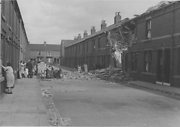 Donated by Hartlepool Museum Service
Donated by Hartlepool Museum ServiceDated 1940
Belongings are stacked on the roadside after a hit from an air raid on 26 August 1940.
More detail » Faulder Road Bomb Damage
Faulder Road Bomb Damage
 Donated by Hartlepool Museum Service
Donated by Hartlepool Museum ServiceDated 1940
The backyards of the houses damaged by a bomb from an air raid on 26 August 1940
More detail » Faulder Road bomb damage
Faulder Road bomb damage
 Donated by Hartlepool Library Service
Donated by Hartlepool Library ServiceDamage done to a building in Faulder Road, Hartlepool after being bombed in August 1940. Note the man stood in the doorway, it looks like he wasn't planning on leaving!
HHT&N 437
More detail » Fire Guard Training (1)
Fire Guard Training (1)
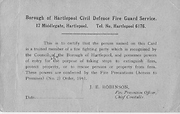 Donated by Mrs. Marian Bunn
Donated by Mrs. Marian BunnOne side of a Civil Defence Fire Guard card belonging to Miss Iris Metcalfe.
More detail » Fire Guard Training (2)
Fire Guard Training (2)
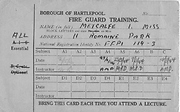 Donated by Mrs. Marian Bunn
Donated by Mrs. Marian BunnSide two of a Fire Guard Training card belonging to Miss Iris Metcalfe.
More detail » First Aid Post
First Aid Post
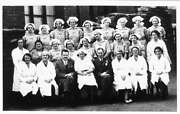 Donated by Douglas Ferriday
Donated by Douglas FerridayPart of the Hartlepool Library Service collection
First Aid post at old Hartlepool in the 1940s. A mixture of Doctors, nurses and auxilary nurses in attendance.
HHT+N 56
More detail » First Aid Post
First Aid Post
 Donated by Albert Harris
Donated by Albert HarrisLocation in Hartlepool unknown but taken in World War 2.
On the photo third from right on top row is Tommy Harland 1904-81 who was Gladys Harland's father. Tommy had lost a leg in a motorcycle accident on the Tees Road in October 1924.
More detail » Four women in a lifeboat
Four women in a lifeboat
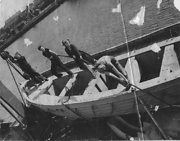 Donated by Hartlepool Museum Service
Donated by Hartlepool Museum ServiceFour women in a lifeboat aboard a ship. Ship believed to be The Empire Nigel.
More detail » From Log Book Graythorp School
From Log Book Graythorp School
Notes taken from Log Book held in Durham County Record Office- these notes illustrate a school with a massive community spirit.
On 26th January 1926, the school was opened by Durham County Council and 77 pupils were admitted by John Henry Fenny the headmaster. A week later there were 82 children and they were organised as follows;
Class 1 Standards 4,5,6,7 taught by Mr Fenny
Class 2 Standards 1,2 and 3 by Miss Toller
Class 3 Infants taught by Mrs Smith
An inspector's report of 1926 states 'This school only opened 7 months ago and the atmosphere and tone are already such as to deserve commendation and warrant expectation of a progressive and successful future'
In 1928 the two brightest pupils, Arthur Fenny (b. 1916) and Ronald Walker(b.1917) were awarded junior scholarships to Henry Smith School Hartlepool with free education. Throughout the history of the school, there are similar references to a number of pupils being likewise successful. A further inspection in 1928 commented on standards in the school which 'serves a somewhat isolated community'. When the top girls left in December 1928, they were presented with a new 1928 penny and an orange each.
In July 1929, the Education Committee decided on a suggestion of the board of education that scholars over 11 should be removed from Seaton Snook school and accommodation be found for them at Graythorp School. In August 1929 this happened and 14 children were moved.
By 1930 the school had 116 pupils and in July of that year, school was closed as children went to the Aerodrome to watch the Prince of Wales leave by RAF plane for London, many having already watched him play golf at Seaton the previous evening.
In 1938 gas masks were given to Graythorp residents. In October of 1938, the Seaton Snook children were brought by Bee Line bus to Graythorp School and Seaton Snook school closed. Furniture was transferred by 'motor lorry'
in June 1939 some children attended North Seaton School Camp in Northumberland and were taken by United Bus. One girl returned to be taken to Scarlet Fever Hospital.
On September 18th 1939, 30 evacuees and 2 teachers were billeted in the village FROM St Patrick's School Sunderland. By October 9th, nine had left.
On November 1st permission was granted by Sunderland Education Authority for the evacuees to have a holiday as it was All Saints's Day.
On a very snowy 18th January 1940, teacher Vera Brooks from Coundon arrived at school at 11.30 a.m. She had travelled by bus from Bishop Auckland to Middlesbrough but as there was no Transporter Road bus to Hartlepool, she then had to go by bus to Stockton, then by train from Stockton to West Hartlepool, by bus from West to Seaton and had then finally walked to Graythorp (how many would do that these days ?!)
By April 1940, only 4 of the Sunderland evacuees remained. On 15th July, 1940 windows were broken in an air raid and 24 high-explosive bombs were dropped near school making a large crater near boiler house.
IN RED CAPITALS 7th April 1941 the school was made useless because of a mine dropped by enemy parachute, 30 houses and the parish hall severely damaged. Much of school stock and fittings useless.
April 28th 1941 children taken by Beeline bus to High Clarence School the 8 Seaton Snook children being collected first and then the 35 Graythorp children. Various raids over next months and intricate timetable to accomodate all children.
July 8th 1942 High Clarence School damaged by enemy action.
June 29th, 1942 Headteacher Mr Fenny absent with an infected boil caused by a fly bite. On 23rd July he had an operation and subsequently died on Aug 2nd (not clear if because of the original infection but seems likely)
August 1942 hut being erected at Graythorp and until school is ready, children being taught at no.10 Graythorp rented by Durham Council and Seaton Snook Mission Hall.
September 1945- new building ready and 56 on roll.
On 17th July 1948 the first PTA meeting was held and over the next years of the school, this was a very active group and numerous and varied activities took place over the final years of the school. From 1948, the headteacher began to take older pupils round the nearby Gray’s Shipyard and this seems to have happened annually. presumably many of the pupils would soon work there.
In September 1957, the school closed, the children were sent to Haverton Hill or High Clarence and Mr Jewett, the Head, was appointed headteacher of Roseberry Junior School Billingham.
More detail » Gas Attack! by Ted Bage
Gas Attack! by Ted Bage
In 2005 Hartlepool's Museum and Library Services worked together on a project called 'Their Past, Your Future', which commemorated the part played by local people in the Second World War. As part of the project Ted Bage from the 'Writing Together' group reminisced about his experiences as a child during the War. This is his story, in his own words:
In 1942 I was ten years of age. When I think about that night in 1942 I can’t help having a little laugh. It seems now that it could be a scene in a Charlie Chaplin picture or Laurel and Hardy but believe me that night we were petrified, panic stricken, you name it we had it all.
The air raid siren had sounded and myself, mam, my sister Manna brother Ronnie and baby Terence huddled together under the stairs. Guns fire, bombs dropping, it seemed as if the gunfire was running down our path. My dad always stood outside just in case any emergencies happened. He could hear wardens running along the street blowing whistles. A man ran past our gateway (not a warden) and shouted “GAS!” Dad came hurrying into the house and quickly put us all in the downstairs bathroom. We all had gas masks. Dad and mam helped us to put ours on and make sure they were on right. Little Terence was put inside his gas mask and placed in the bath. How mam and dad got those masks on I do not know. But with the bombs dropping, gunfire etc. and all of us panic-stricken they still managed. Dad eventually got us all calmed down then got a couple of blankets and doused them with water. He put them on the door and window trying to keep out as much as possible. He told us how to breathe and not panic, we did as we were told but we could not stop the sweat and fear that we felt.
Our bathroom window was next to our front door. We had a path from our street to the front door and bathroom window. It was from this window we heard knocking and at the same time the all clear was sounding. Apparently Big Jack Lamplough had just finished his shift as an engine driver for L.N.E.R. and his wife had told him that she hadn’t heard from next door.
“Are you in there Walter? (dad)”
“Yes Jack, has the gas cleared up yet?”
“What gas? They haven’t dropped gas, just incendiary bombs (fire bombs).”
Dad told us to take our gas masks off, took off the blankets and opened the bathroom window. We were matted in sweat and I can tell you now we thanked God for our safety. With masks off and fresh air getting into our lungs, it was one of the best moments of that awful night.
And to dad I would say again what he always said.
“Better safe than sorry”
Good old dad.
“Shush”, said mam. “Don’t wake the bairn up.”
The baby had slept through the lot.
More detail » Gas mask training for children
Gas mask training for children
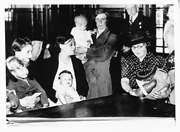 Donated by Douglas Ferriday
Donated by Douglas FerridayPart of the Hartlepool Library Service collection
Mothers being shown how to use a gas mask designed for babies and young children. c1939
More detail » Gill Street VE Day Party (1)
Gill Street VE Day Party (1)
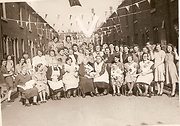 Created by unknown
Donated by Mr. Billy Henderson
Created by unknown
Donated by Mr. Billy HendersonPart of the Harry Henderson collection
Dated 1945
A street party in Gill Street celebrating VE Day - almost exclusively women and children.
More detail » Grammar Schoolboys 1938-9?
Grammar Schoolboys 1938-9?
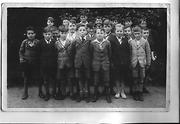 Donated by Brenda Wright
Donated by Brenda WrightDated 1938
A bit of mystery surrounds this. The boy third from right on the front row is Robert Bramley who went to the Grammar School. Was the photo taken in Brinkburn grounds or Lauder Street ? The boys appear not to be wearing strict uniform but most do appear to be carrying gas masks over their shoulders.
More detail » Graythorp School after air raid
Graythorp School after air raid
 Created by Hartlepool Mail
Dated 1941
Created by Hartlepool Mail
Dated 1941In an air raid of April 1941,heavy damage was done not only to the school, but to the Mission Church, the Coop and 40 houses. fortunately nobody was badly injured.
This raid is documented in the notes about the school on this page. The children had to move to High Clarence School.
More detail » Greatham Hospital Home Guard
Greatham Hospital Home Guard
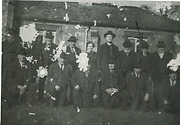 Donated by Hartlepool Museum Service
Donated by Hartlepool Museum ServiceTaken outside Greatham Hospital the Master(clergyman standing in middle) and 13 men (the number the building could house). The lady is probably the Matron who looked after the elderly gentlemen.
More detail » Greyhound Stadium Bomb Damage
Greyhound Stadium Bomb Damage
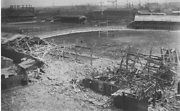 Donated by Hartlepool Museum Service
Donated by Hartlepool Museum ServiceDated 1940
Top left is the Lion Hotel, Clarence Rd. with the Gas Holder next to it. On the skyline is Steetley's magnesite chimney & the dock's cranes
More detail » Group of women
Group of women
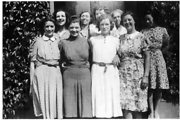 Donated by Hartlepool Museum Service
Donated by Hartlepool Museum ServiceGroup of women by a building entrance. Dress suggests 1940s.
More detail » Group of women (2)
Group of women (2)
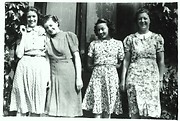 Donated by Hartlepool Museum Service
Donated by Hartlepool Museum ServiceFour of the same women in previous picture.
On reverse of picture. 1(?) (2) Peggy Leah (3) Daisy Newcombe (4) Euphemia Neilson daughter of picture framer York Road. Lived in Park Road
More detail » Hartlepool Railway Athletic - Lord Joicey Railway Shield Winners
Hartlepool Railway Athletic - Lord Joicey Railway Shield Winners
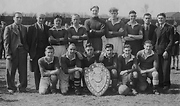 Donated by Mr. John Brooker
Donated by Mr. John BrookerDated 1945
The victorious Hartlepool Railway Athletic Football Club on the Grayfields enclosure in 1945, having just won the Lord Joicey NER Homes Railway Shield. They won the Shield again in 1948 defeating Starbeck Harrogate 2 - 1 on Grayfields to add to their Church League title.
More detail » Healthy Milk
Healthy Milk
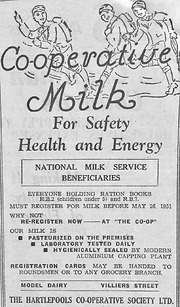 Created by NDM
Donated by Hartlepool Museum Service
Created by NDM
Donated by Hartlepool Museum ServiceDated 1951
In the post war days of 1951, the Coop advertised the healthy value of milk and reminded the public that they needed to be registered to buy it. The Coop dairy was in Villiers Street until the mid 1960s when it was demolished to make way for the Shopping Centre.
More detail » Home Guard
Home Guard
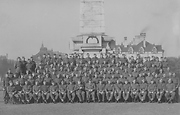 Donated by Douglas Ferriday
Donated by Douglas FerridayPart of the Hartlepool Library Service collection
This is believed to be a photograph of the Hartlepool Home Guard. So far only one person has been identified - Charlie watson (third row down, extreme left - excluding the group of four standing soldiers).
Jane Campbell has informed us that her grandfather John Moor (then Headmaster of Henry Smiths School) is seated in the front row, ninth from left.
More detail » Home Guard 1944
Home Guard 1944
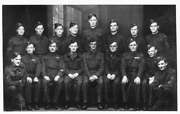 Donated by Douglas Ferriday
Donated by Douglas FerridayPart of the Hartlepool Library Service collection
Picture of the Home Guard from 1944. No names known
More detail » Home Guard Equipment
Home Guard Equipment
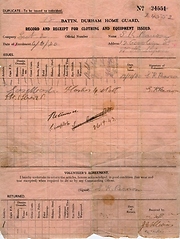 Donated by Mr. Steve Pearson
Donated by Mr. Steve PearsonDated 1940
Form issued to Steve Pearson when he joined the Hartlepool Home Guard in 1940. Steve served with the unit commanded by Major Cameron and their unit HQ was in 'Briarfields'. Mr. G. Usher was their Quartermaster.
More detail » Home Guard Greatham
Home Guard Greatham
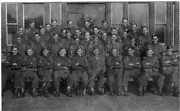 Donated by Hartlepool Museum Service
Donated by Hartlepool Museum ServiceTypically posed group photo of Home Guard platoon from Greatham.
More detail » Home Guard at the War Memorial
Home Guard at the War Memorial
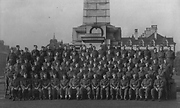 Donated by Mr. Steve Pearson
Donated by Mr. Steve PearsonA group photograph, probably of the "Gray's" Home Guards in front of the War Memorial on Victoria Road, with Sir William Gray sitting front row, centre.
HHT+N 51
More detail » Home Guard in the wet
Home Guard in the wet
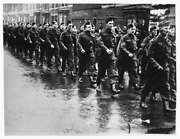 Donated by Douglas Ferriday
Donated by Douglas FerridayPart of the Hartlepool Library Service collection
The Home Guard marching in the rain
More detail » Horse power
Horse power
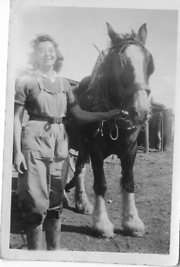 Donated by Mrs. Ada Procter
Donated by Mrs. Ada ProcterLand Army girl Olive Tennick with a very patient-looking heavy horse.
More detail » Howbeck Hospital Bomb Damage
Howbeck Hospital Bomb Damage
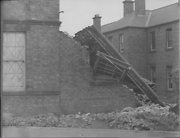 Donated by Hartlepool Museum Service
Donated by Hartlepool Museum ServiceDated 1942
Side view of collapsed roof after raids on 7/8 July 1942
More detail » Howbeck Hospital Removing Shell
Howbeck Hospital Removing Shell
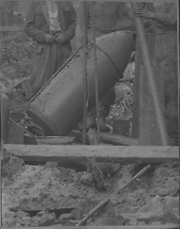 Donated by Hartlepool Museum Service
Donated by Hartlepool Museum ServiceDated 1942
Men using a pulley to move a large mortar shell from the ground.
More detail » In the Sea Scouts
In the Sea Scouts
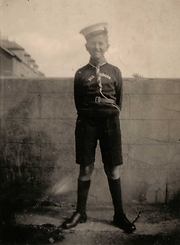 Donated by Rosa Simon
Donated by Rosa SimonDated 1945
A young Derek Simon in his Sea Scouts uniform in 1945.
More detail » Inspecting a wreck
Inspecting a wreck
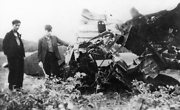 Donated by Hartlepool Library Service
Donated by Hartlepool Library ServiceTwo youths inspecting the wreck of a British aircraft- the Avro Lancaster- during WW2. Believed to be around Elwick Village.
HHT&N 432
More detail » Inspecting a wreck (2)
Inspecting a wreck (2)
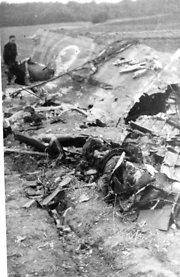 Donated by Hartlepool Library Service
Donated by Hartlepool Library ServiceA man inspecting a wreck of a British aircraft -the Avro Lancaster- during WW2. Believed to be around the Elwick area.
HHT&N 439
More detail » Inspecting a wreck (3)
Inspecting a wreck (3)
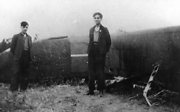 Donated by Hartlepool Library Service
Donated by Hartlepool Library ServiceTwo youths stood next to the wreck of an Avro Lancaster aircraft during WW2. Believed to be in the Elwick area.
HHT&N 441
More detail » Inspecting the damage
Inspecting the damage
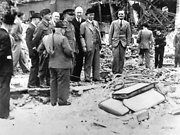 Donated by Hartlepool Library Service
Donated by Hartlepool Library ServiceDated 1941
This picture shows the Northern Regional Civil Defence Commissioner, Sir Arthur Lambert (wearing a bowler hat and armlet) at the scene of the Elwick Road/Houghton Street bombing in West Hartlepool, on 20th August, 1941. The then Mayor and Chairman of the Emergency Committee, Ald. O. Lupton, is on Sir Arthur’s right.
The Elwick Road bombing was West Hartlepool’s worst experience, for besides causing extensive damage, it accounted for twenty-three of the town’s forty-eight fatal air raid casualties. The death roll comprised twelve women, six men and five children and all but two lived in the Elwick Road and Houghton Street area.
The Elwick Road bombing was one of forty-three air raids on The Hartlepools between June 1940 and March 1943.
(Extracted from “Air Raids on the Hartlepools” by Chas Cowley published in 1945)
HHT&N 436
More detail » John Proudlock's War
John Proudlock's War
In 2005 Hartlepool's Museum and Library Services worked together on a project called 'Their Past, Your Future', which commemorated the part played by local people in the Second World War. As part of the project John Proudlock reminisced about his time as a Home Guard Despatch Rider. This is his story:
John, his two brothers and a sister originally lived in Cornwall Street. His father worked at I.C.I. Billingham;the family moved to Haverton Hill for a few years then moved back to Cornwall Street.
John was apprenticed to the Central Marine Engine Works (CMEW) and, as he was classed as an essential worker, he was not allowed to enlist in any of the armed services. Instead, he chose to join the Despatch Riders Group attached to the Home Guard.
The Home Guard firing practice was carried out at the back of the Spotted Cow public house at Elwick. Targets were set up on a concrete block, still in situ, and the apprentices threw ‘Blacker Bombards’ at the targets - these were anti-tank mortar bombs. There was also an Army munitions store on the site! After practice the group would retire to the Spotted Cow for a drink.
John was a busy man. He carried out guard duty on the North Sands, close to the Spion Kop Cemetery (the beach was covered in barbed wire to deter invaders), standing in the pillboxes along the sand dunes. His rifle was not loaded but the ammunition was close to hand.
A typical week would be: all one night on Home Guard Duty, all one night as Fire Watcher on St Cuthbert’s school roof and one night training. Sunday was Parade Day, something he enjoyed doing, motoring round the neighboring villages (the petrol was supplied by the Motor Transport Department in the Armoury). He also attended night school as part of his apprenticeship; he was paid one penny a week.
After the war he was at sea for two years and married on his return home.
More detail » Joseph and Ronnie Garrington
Joseph and Ronnie Garrington
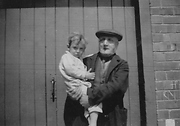 Donated by Mr. John Brooker
Donated by Mr. John BrookerJoseph and Ronnie Garrington, probably taken at the back of No.9 Park Road, in 1944/45.
More detail » Ladies doing war work ?
Ladies doing war work ?
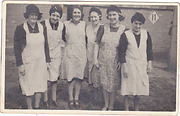 Donated by Alys Delafield
Donated by Alys DelafieldUnclear where the image was taken but probably the ladies were doing war work. Third from the left is Evelyn Gray.
More detail » Land Army Certificate and Badge
Land Army Certificate and Badge
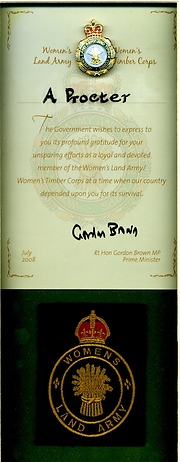 Donated by Mrs. Ada Procter
Donated by Mrs. Ada ProcterAda Procter's (nee Tennick), Women's Land Army Certificate and cloth badge. Ada served in the Land Army for five years, working at many different farms in the area.
More detail » Land Army Girl Doris Morgan
Land Army Girl Doris Morgan
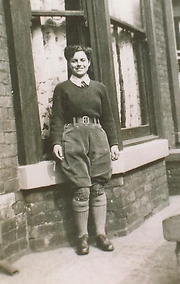 Donated by Mr. John Robinson
Donated by Mr. John RobinsonDated 1945
Doris Morgan (later Robinson), in her Land Army uniform in 1945.
More detail » Land Army Girl and a German P.O.W.
Land Army Girl and a German P.O.W.
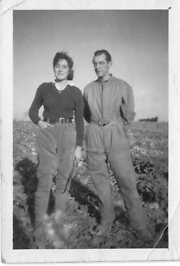 Donated by Mrs. Ada Procter
Donated by Mrs. Ada ProcterLand Army girl Ada Procter standing next to a German Prisoner of War.
More detail » Land Army Girl at Elwick
Land Army Girl at Elwick
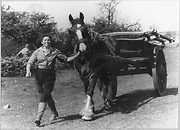 Donated by Mrs. Ada Procter
Donated by Mrs. Ada ProcterAda Procter's (nee Tennick), twin-sister Olive in her Land Army uniform, leading a horse and cart on Joe Jobson's farm at Elwick.
More detail » Land Army Life by Sarah Bird
Land Army Life by Sarah Bird
In 2005 Hartlepool's Museum and Library Services worked together on a project called 'Their Past, Your Future', which commemorated the part played by local people in the Second World War. As part of the project Sarah Bird reminisced about her time in the Land Army. This is her story, in her own words:
My name is Sarah Bird, but I was Sarah Knee. I was fourteen in 1939. I left school at fourteen and went straight into work, tailoring in Leeds. I joined up when I was seventeen. You had to join something – it was either the Land Army or the Forces. My three sisters had joined the Land Army before me, so there were four sisters in the Land Army and our photographs were in the local paper. I was sent down to Worcestershire, Lucy and Bessie were sent to York to a flax factory and my eldest sister was sent to Tofts Farm at Wolviston. My oldest sister, Janet, would be four or five when I was born and there were two more in between, and me mother had lost one before that. But that’s how it was in those days, no contraception or things like that.
The farm in Worcestershire had thirteen girls working. Hundred-acre fields with sugar beet and that sort of thing. Polish Prisoners of War used to help out as well and they were very nice, you know. They were picking the language up. But I didn’t hear tell of any romances with the local girls. You weren’t encouraged. I was in a hostel and EVERY day for the seven months I was there we had bread and cheese to take out for our lunch. But then we had a hot meal when we got back. And sometimes, if it was very hot, we used to come home in the daytime and go back to work after tea when it had cooled down and work till eight or nine o’clock at night. Our uniform was trousers, like riding breeches; a green jumper and an armband and a hat with a brim and a badge on the front. The farmer I worked for gave us half a crown every week, which was a fortune in those days. He was a nice man and I kept in touch with him. After I was married, Alan and I went for a few days holiday and we went round Worcestershire where I worked and we went to the farm. He was ever so pleased to see us. He still had the same John Deer tractor.
After I had been down in Worcestershire for six months the farmer that employed my sister up here wanted me to transfer and go and live in there, which I did. I was there for three or four years before I left and got married. We called the farmer “Old Nick”. I used to think he was an old man – he was only thirty-six! He used to make fun of us. He had a ram running about in the farmyard and it was a blooming nuisance. One day it came after me with its head down and I ran in the house. I said “you want to get shot of that! It’s just tupped me!” Well, I didn’t realise what I’d said! I never heard the last of it! He told everybody that came “Sally’ll be expecting lambs in the spring”. And I used to drive the tractor. He’d set me on to harrow with the tractor and I was so busy trying to go straight I didn’t realise I’d lost the harrows off! I don’t how long I’d been going with no harrows on. I never heard the last of that. There was an ack-ack gun in the last field at Tofts farm and one time I was spreading muck in the field next to it. All of a sudden these ack-ack guns went off. Well I nearly jumped out of me skin! They were firing out to sea. Oh, dear me. But we were never bombed on the farm. We didn’t see many air raids either.
The farm was about a mile and a half from Wolviston Village. I stayed in the farmhouse with my sister. There were just the two of us and two men. We got thirty bob a week; very cheap labour. We were up first thing on a morning. There were no milking machines, they were all to milk by hand. I’d never been near a cow, but that’s what he wanted me for – milking. But it was amazing how quick you adapted. It didn’t take long for me to learn. In fact after a year or so, if we were busy harvesting, the cows were to milk just the same. I’ve seen me have to go up to the farm and milk all the lot by myself. Fourteen cows. It doesn’t seem very much, but to milk them all by hand…it took some time. Of course, there were one or two that weren’t fussy about giving you a kick. If one kicked and it upset the milk, there was more concern about the milk than there was about you being hurt!
We just had the one horse and it was wall-eyed (cross-eyed). And we used to feed the cows with brewers’ grains. We kept them in a big trough outside the byre and I remember one day this blooming wall-eyed horse came in and started eating the grains. Daft me went to shoo it off. Out went its leg and caught me; well it winded me, you know, and I had to go and sit in the byre till I got me breath back. Of course I didn’t get much sympathy; “you shouldn’t have been so daft!” I didn’t have to kill chickens there, but I learnt how to do them when I got married. I used to rear chickens for Christmas for a bit of pocket money and I used to have to pull their necks. It’s amazing what you can do when you have to.
The missus that I worked for on the farm; she had a nephew called Alan. I met him one day when they were all at Stockton mart and he was there and I was there and I liked the look of him. Anyway, he called at the farm soon after and we went out together. We never went to any dances. I used to go to Wolviston Church and he used to come and pick me up on his motorbike. I didn’t like the motorbike and his mother didn’t like it, either. I courted him for six years before I married him. I’ve lived on a farm ever since.
More detail » Lena Garthwaite's Wartime School Report
Lena Garthwaite's Wartime School Report
Lena Irene Garthwaite's school reports during the early years of the Second World War.
More detail » Lena Irene Garthwaite wartime Junior Commercial Certificate
Lena Irene Garthwaite wartime Junior Commercial Certificate
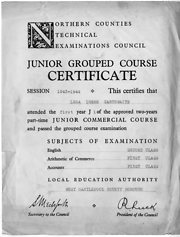 Donated by Keith Alder
Donated by Keith AlderDated 1944
Irene's hard work at school clearly paid off as at the age of fifteen, successfully gained her Junior Commercial Certifacate with excellent grades.
More detail » Mollie Keenan (3)
Mollie Keenan (3)
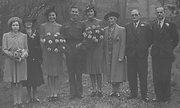 Donated by Mr. John Watson
Donated by Mr. John WatsonDated 1941
On April 7th, 1941, Mary Irene (Mollie) Keenan married Stan Warwick at St. Joseph's Church. Mollie met Stan at Catterick through an introduction from a friend.
More detail » Mrs Ivy Robins Remembers
Mrs Ivy Robins Remembers
In 2005 Hartlepool's Museum and Library Services worked together on a project called 'Their Past, Your Future', which commemorated the part played by local people in the Second World War. As part of the project Ivy Robins from the 'Writing Together' group reminisced about her memories of life on the Home Front. This is her story, in her own words:
I remember the third of September 1939. My mother was crying over the deaths of her two brothers, who were killed in the 1914 war, and saying that it was supposed to be the war to end all wars and asking what they had died for. I suppose it was a question many people were asking that day. The week before we had been on holiday in Sleights. My uncle had taken us there over the moors in his car. The moors had been deserted, but when we came back tanks and soldiers were everywhere.
I was soon evacuated to Scarborough. I was given a paper carrier bag containing a tin of biscuits and a tin of corned beef. Three of us were billeted with two sisters. I remember we used to do the washing up and roll newspapers tightly round a poker to make fire lighters. We attended school for half a day with local pupils together with children from a school in Hull. I soon grew very homesick and after a visit home for Christmas I did not return.
My father was a manager of a grocers shop and food rationing had arrived complete with rationing books for most of the essentials, butter, sugar etc. At the end of each month we would all sit round the table and help dad count the coupons, and complete a return for the Food Office. This was difficult as very often they were single and about the size of a postage stamp. In the meantime I secured a post with Hartlepool Public Library. In those days we wore overalls and they were made out of blackout material. The only colour was the binding on the pockets.
In 1942 I was called up and sent to Coventry to work in a hostel for workers in the aircraft factories. The city centre and the cathedral had been bombed. After two years I moved to Rugby as a receptionist dealing with allocation of rooms, ration books mail etc. We would sit around the wireless each evening, chatting, and making toast with Marmite. No butter of course. After VE-Day we were allowed home. My war had ended.
More detail » Municipal Buildings World War 2
Municipal Buildings World War 2
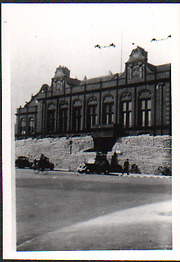 Donated by R A Armour
Donated by R A ArmourPart of the Hartlepool Museum Service collection
This image is of sandbags protecting the Municipal Buildings in Church Square. On reverse, it says 'from photo belonging to Mr RA Armour 43 Arncliffe Gardens West Hartlepool'
More detail » Museum Accomodation for ARP staff WW2
Museum Accomodation for ARP staff WW2
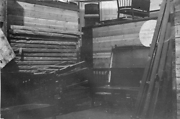 Donated by Hartlepool Museum Service
Donated by Hartlepool Museum ServiceMuseum Accomodation for ARP staff W2.
Museum main floor. South east bay window shown between shuttering (6" x 2" deals) covering case containing birds of prey & ….covering large desk case. Photograph taken from tiled floor windows shuttered outside (1 boards) one lamp burning. A.R.P. sleeping bunker filed & stood on end.
More detail » Museum Accomodation for ARP staff WW2
Museum Accomodation for ARP staff WW2
 Donated by Hartlepool Museum Service
Donated by Hartlepool Museum ServiceMuseum Accomodation for ARP staff WW2.
Note structure at entrance to lower gallery. It is a light trap. The gallery was the ARP restroom. Note dooryway in background which is entrance to ladies room. It is in the partition between rest and ladies room. The conservatory roof is covered with felt. The bomb on the dog track smashed almost every glass. The shuttering on the right covers the statue of Susanah, Innocence is also protected (fortunately) G.W. Butcher
More detail » Museum Accomodation for ARP staff WW2
Museum Accomodation for ARP staff WW2
 Donated by Hartlepool Museum Service
Donated by Hartlepool Museum ServiceMuseum Accomodation for ARP staff WW2.
More detail » Musgrave Street bomb damage
Musgrave Street bomb damage
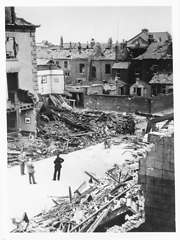 Donated by Douglas Ferriday
Donated by Douglas FerridayPart of the Hartlepool Library Service collection
Dated 1940
The picture is dated 1940. On 19th- 20th June, the Musgrave St area was badly damaged and it was the first of many raids on the town. Four highly explosive bombs were dropped on the area and amazingly only one man and one woman were killed although there were many more injured. Four shops, six houses and the Central Hotel were completely demolished and 30 shops, 63 homes, one pub and St Joseph's School were badly damaged. Over 100 other buildings were damaged.
HHT&N 46
More detail » Musgrave and Queen Streets Bomb Damage
Musgrave and Queen Streets Bomb Damage
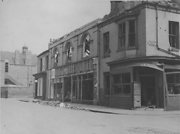 Dated 1940
Dated 1940Showing damage to the furniture store & Oliver's Fish Shop (on the corner) after being bombed during an air raid in June 1940. St Joseph's School can be seen in the background
More detail » My Bicycle
My Bicycle
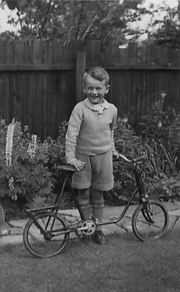 Donated by Mr. John Watson
Donated by Mr. John WatsonDated 1942
1942. John Watson with one of his favourite bicycles, all painted black.
More detail » My Tricycle (1)
My Tricycle (1)
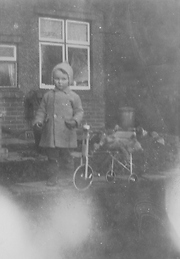 Donated by Mr. John Watson
Donated by Mr. John WatsonDated 1939
1939. A young John Watson stands proudly beside his new tricycle in the back garden of his home in Hutton Avenue.
More detail » My Tricycle (2)
My Tricycle (2)
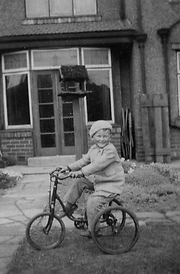 Donated by Mr. John Watson
Donated by Mr. John WatsonDated 1940
Having outgrown his earlier tricycle, young John Watson now has a new machine. This photograph was taken sometime in 1940, and in the background, leaning against the side of the house, are wooden blackout shutters.
More detail » National Registration Identity Card
National Registration Identity Card
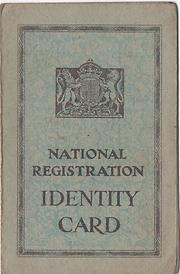 Donated by Frank Sherwood
Donated by Frank SherwoodNational Registration Identity Card issued to Jane Sherwood, 10 Kimberley Street, West Hartlepool, in 1943.
More detail » National Registration Identity Card (2)
National Registration Identity Card (2)
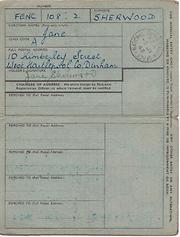 Donated by Frank Sherwood
Donated by Frank SherwoodThe inside of Jane Sherwood's Identity Card.
More detail » National Registration Identity Card (3)
National Registration Identity Card (3)
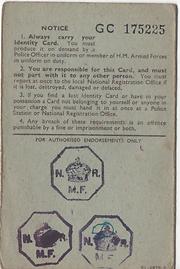 Donated by Frank Sherwood
Donated by Frank SherwoodThe rear of Jane Sherwood's Identity Card.
More detail » Norman Henry Wise and Doris Dove - 1942
Norman Henry Wise and Doris Dove - 1942
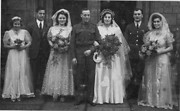 Created by unknown
Donated by Mr. Norman Wise
Created by unknown
Donated by Mr. Norman WiseDated 1942
The wartime wedding of Norman Henry Wise and Doris Dove, at St. Oswald's Church, on December 19th, 1942.
More detail » Not Fussy: rationing by Beryl Madden
Not Fussy: rationing by Beryl Madden
In 2005 Hartlepool's Museum and Library Services worked together on a project called 'Their Past, Your Future', which commemorated the part played by local people in the Second World War. As part of the project Beryl Madden, from the 'Writing Together' group, reminisced about rationing in the War years. This is her story, in her own words:
Time and again I hear mothers complain that their children are “fussy eaters”. This is not a phrase I heard much when bringing up my children in the ‘60s and I can’t imagine it being used at all during the ‘40s when I was growing up.
Coming from a family of nine children, five of whom were born before the end of the war we certainly didn’t have a fussy eater among us. With so little choice of food available you couldn’t afford to be fussy. I’m sure we were also lucky to have a mother who was not only a very good cook but also an inventive one. It seems, looking back, that the delicious aroma of new baked bread was always present in our house and there was some sort of stew constantly bubbling away in a huge black iron pan on the stove.
Our back garden during the war years and for a long time afterwards never saw a blade of grass – you couldn’t eat grass. There were rows of onions, cabbages, carrots and turnips together with a huge clump of rhubarb. We also kept a few chickens to supplement our egg ration along with a duck which adopted us for a while until it decided to fly off again. We were never sure whether it took off under somebody’s raincoat during the night. The duck was probably attracted by the food put out for the chickens which of course was nothing more than scraps from the table. Nothing was wasted anyway but the varied diet from those scraps ensured larger than average eggs with lovely golden yolks. Other leftovers like potato peelings were saved in an old bin in the garden and collected regularly by a local man who kept pigs. He would boil up the contents to make pig swill to feed his animals. I suspect that we occasionally received a morsel or two in return when the pigs went to slaughter.
All in all our little treasure trove of a garden provided many of life’s necessities and gave us the means to do a little bartering. My mother was inordinately fond of very strong cups of tea and it was one of my chores to take an egg or two to certain neighbours to exchange for half a cup of tea (leaves, that is).
Food rationing meant that most people, even if they didn’t have a garden or were not as resourceful as our family, could have a nutritious diet if not a very exciting one. When their usual provisions were not available many women found themselves capable of managing with the alternatives available. Some, like my mother, looked on it as a challenge. For example meat, being in short supply, meant that many of our wonderful pans of stew contained plenty of home grown vegetables with lots of filling split peas or lentils and nothing more “meaty” than bacon bones or lap (otherwise known as flap) of mutton which was little more than fat. Cooked slowly for hours and with hearty dumplings floating on the top I would defy anyone to put down a more hearty meal to a hard-working man and several hungry children home from school. We hardly had room for the homemade rice pudding for afters – but we managed.
Weird and wonderful things sometimes, of necessity, found their way onto our plates and one of the weirdest in my memory was sheep’s head broth. I had innocently regarded this in the same culinary category as shepherd’s pie, ie. it does not actually contain a shepherd! I was greatly disillusioned by strolling unexpectedly into the scullery one day and finding the offending item facing me on the table. Fortunately my mother made allowances when for the first time in my life I became a “fussy eater”. I refused to eat the stew the next day and made her promise faithfully to let me know if she ever cooked this particular dish again. She was also understanding about the spell of nightmares I had too. In return I silently promised not to mention any of this to the rest of the family. My mother was doing her best to feed us well and she hadn’t poisoned any of us yet.
I know people who remember being hungry during the war but I certainly don’t. Although we suffered from the usual childhood illnesses and diseases, we never had asthma or the multiple allergies that many children of today are prone to. I know that there can be many causes of these ailments but I can’t help wondering whether not being “fussy eaters” paid off in more ways than one.
More detail » Outside the Boilermakers Club circa 1940
Outside the Boilermakers Club circa 1940
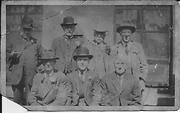 Donated by Jacky Armstrong
Donated by Jacky ArmstrongOutside the Boilermakers Club circa 1940.
More detail » P.O.W. at Catcote Farm
P.O.W. at Catcote Farm
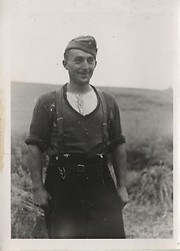 Donated by Hartlepool Library Service
Donated by Hartlepool Library ServiceAn un-named Prisoner of war at Catcote Farm.
More detail » Pilgrim Street Bomb Damage
Pilgrim Street Bomb Damage
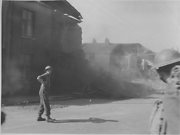 Donated by Hartlepool Museum Service
Donated by Hartlepool Museum ServiceDated 1940
At 4.35am on 30 August 1940 a bomber flew past & released two HEs which hit Pilgrim & Hilda Streets. There were eleven people in a fish shop cellar of whom nine died including six children. ARPs survey the damage.
More detail » Pilgrim Street bomb damage 2
Pilgrim Street bomb damage 2
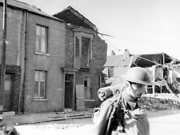 Donated by Hartlepool Library Service
Donated by Hartlepool Library ServiceA member of the Home Guard next to the bomb damage in Pilgrim Street. Destruction caused by HEs dropped at 4.35am on 30 August 1940.
HHT&N 435
More detail » Post-war Retail Licence
Post-war Retail Licence
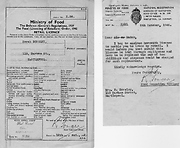 Donated by Mr. William Horsley
Donated by Mr. William HorsleyDated 1946
A copy of a letter and the Retail Licence received by Mrs. Norah Horsley, for her grocery shop at 115 Durham Street. The building has since been demolished and St. Helen's school now occupies the site.
More detail » Prefabs Lime Grove area 2
Prefabs Lime Grove area 2
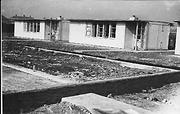 Part of the Hartlepool Library Collection collection
Part of the Hartlepool Library Collection collectionDated 1946
A closer view of the homes quickly erected following World War 2. The houses shown appear to be occupied and a paper boy visiting one. Builders appear to have left a milk bottle near the foundations of further houses.
HHT&N 137
More detail » Prefabs in Lime Grove 1946
Prefabs in Lime Grove 1946
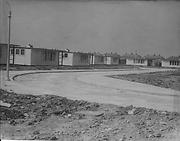 Part of the Library collection collection
Part of the Library collection collectionDated 1946
A number of prefabricated houses were built in the Dyke House area following World War 2. In 1946, Lime Grove (later Crescent) Willow Grove, Birch Grove and Larch Grove were named. The houses in the background are probably either in Easington Road or Raby Road.
HHT&N 136
More detail » Premier Hotel Bomb Damage
Premier Hotel Bomb Damage
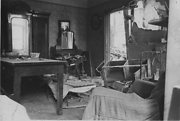 Donated by Hartlepool Museum Service
Donated by Hartlepool Museum ServiceDated 1940
Premier Commercial & Temperance Hotel on the corner of Stockton Street & Bell Terrace. This shows what is left of one of the bedrooms after an air raid in August 1940. The hotel was demolished in 1950.
More detail » Premier Hotel Bomb Damage
Premier Hotel Bomb Damage
 Donated by Hartlepool Museum Service
Donated by Hartlepool Museum ServiceDated 1940
Damage to the back of the Premier Commercial & Temperance Hotel on the corner of Stockton Street & Bell Terrace after an air raid on 28 August 1940.
More detail » Quiet before the storm
Quiet before the storm
 Donated by Mrs. Hazel Brooker
Donated by Mrs. Hazel BrookerDated 1939
Kip Herring (left), and Bill Cowan in his army uniform, on the seafront at Seaton Carew in 1939.
More detail » Quiet moment in the Civil Defence
Quiet moment in the Civil Defence
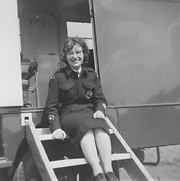 Donated by Mrs. Violet Butcher
Donated by Mrs. Violet ButcherJoan Forstad enjoys a quiet moment sitting on the steps of a Civil Defence vehicle. Volunteers - and later conscripts! - regularly visited local rural communities demonstrating the role of the Civil Defence. Born in 1933, Joan was to too young to be conscripted, however, like all the other members of her family, she volunteered for the Civil Defence.
More detail » Ready for work
Ready for work
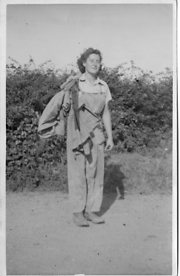 Donated by Mrs. Ada Procter
Donated by Mrs. Ada ProcterLand Army girl Ada Procter ready to start another day's work in the fields.
More detail » Recollections of the War by Hilda Maguire
Recollections of the War by Hilda Maguire
In 2005 Hartlepool's Museum and Library Services worked together on a project called 'Their Past, Your Future', which commemorated the part played by local people in the Second World War. As part of the project Hilda Maguire from the 'Writing Together' group reminisced about her memories of life on the Home Front. This is her story, in her own words:
I am now eighty-three years of age. I was aged seventeen when Neville Chamberlain, Prime Minister, announced that fateful dreaded message. He said that Britain requested “Adolf Hitler, withdraw his troops from Poland, Czechoslovakia. No undertaking took place and consequently Great Britain is now at war with Germany.”
The announcement was made at noon on Sunday 12th or 3rd September 1939. I remember clearly that I was lounging on our old uncomfortable horse-hair sofa, and I shouted gleefully “Whoopee! I’ll get a job now!”
Although I attended Henry Smith School, I’d made lots of unsuccessful “office job applications.” Unknown to my mother, I volunteered to join the WRAF (The Women’s Royal Air Force) and cycled to Middlesbrough for a medical and Doctor told me to but specs. Meanwhile, my Mam had managed to get me a job in a local estate agents office. I eagerly awaited my “conscription” at the age of twenty. But my boss requested a deferment until I trained the new girl.
As my two brothers were in the RAF, and Merchant Navy, I volunteered for the ATS, (Women’s Auxiliary Territorial Service) so that all three services would be represented. Eventually I went for ATS interview at Middlesbrough and had to complete a “diagram form”. I completed it and was horrified when the interviewing officer had the effrontery to imply that I wasn’t intelligent enough for ATS clerical duties. I had completed the form to the end of the last page and most other girls were struggling at the first page. So I was offered the chance to go into ATS as a cook, which I didn’t fancy or Land Army. So I opted for a factory job to be trained as a dilutee fitter. I think it was a con as the government needed more factory workers as many girls liked the glamour of the uniform. I was so disappointed but my brother said that if I had gone into ATS as a cook I could have gone into clerical work later.
So I went to the Stadium, Wallsend to learn the basics of engineering fitter. (By coincidence, my Dad went to Wallsend at the age of twenty, from Scotland). I lived in 98, Charlotte Street, Wallsend. After my training, I went to Parsons, Heaton to work in the projector shop.
I enjoyed working from blue prints, using electric drills, etc, and occasionally as a fitter’s mate to the men. We worked five days – twelve hour shifts, nights included and weekends then off two days. So, when the clocks were put forward, twice in war years, I worked fourteen hours if at work that particular Saturday night. I was happily settled, made a lot of friends, when I was informed that, “as I was already away from home” I would be transferred to Rugby, to work on Radar production.
I lived in a government hostel in Badminton Fields, three miles from Coventry. We often thumbed a lift into Coventry from the huge juggernauts lorries. As we had to rely on the dilapidated buses to get us to Rugby, six miles away, they often broke down. When the BTH (British Thomson Houston) penalised us for being late we all walked out – on strike! Most were lucky to thumb a lift back, but my two friends and I had to walk back, all the way and got no meal as the canteen was closed.
The blackout during the war years was depressing. Everything was rationed – food, soap, washing powder, coal, clothes, kitchenware, pans, kettles. We used to chase the Cadbury van to get our small ration of chocolate. We drank a lot of cocoa, tea rationed, and saccharine tablets in place of sugar. Egg powder for baking – no eggs! Girls used to paint their legs and draw middle seam at the back to represent stockings. However, people were healthier on the food rationing. Nowadays we see an awful lot of obese people.
The local buses finished at 9:30pm. All the buildings had balloon barrages (like inflatable elephants) on the roof and all ships also in the harbour. Piles of sand bags were placed at all buildings to be used to smother the enemy incendiary bombs. The “V” bombs – fired across the channel to the south coast were terrifying as no one knew just when and where they would explode. Everybody had to carry their gas masks at all times. Luckily, we never needed them. Hartlepool and West Hartlepool didn’t suffer such a lot of bomb damage as a lot of bombs fell into the sea. All the major towns and cities, London, Bristol, Coventry etc, suffered a lot of air raids and bomb damage.
The radio show, ITMA (It’s That Man Again), Gracie Fields, George Formby, helped to cheer us up during that sad, dreadful time as did Stanley Holloway’s poems, “With her ‘ead tucked underneath her arm”, “Albert, pick up thy musket” and “Let battle commence”.
More detail » Richardson Westgarth Home Guard
Richardson Westgarth Home Guard
 Donated by Hartlepool Museum Service
Donated by Hartlepool Museum ServiceWritten on back: "Richardson 58 Westgarth Middleton. G. Company Home Guard prior to disbanding"
More detail » Row of Terraced Houses Bomb Damage
Row of Terraced Houses Bomb Damage
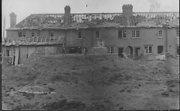 Donated by Hartlepool Museum Service
Donated by Hartlepool Museum ServiceDated 1940
Houses left with no roof tiles after bombing. Air raid shelter in the foreground.
More detail » Salvation Army HQ Bomb Damage
Salvation Army HQ Bomb Damage
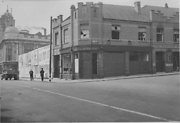 Donated by Hartlepool Museum Service
Donated by Hartlepool Museum ServiceDated 1940
Salvation Army Headquarters on the corner of Stockton Street & Bell Terrace.
More detail » Shelter bunks for sale
Shelter bunks for sale
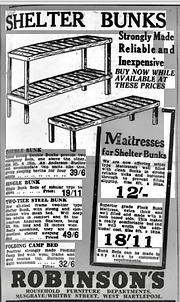 Created by NDM
Donated by Hartlepool Museum Service
Created by NDM
Donated by Hartlepool Museum ServiceDated 1941
In January 1941, Robinson's Deoartment Store were advertising their range of shelter bunks and mattresses which of course were necessities for many at the time.
More detail » Sheriff Street party (1)
Sheriff Street party (1)
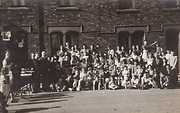 Donated by Geoff Stephenson
Donated by Geoff StephensonA street party - possibly for VE Day? - in Sheriff Street.
More detail » Sheriff Street party (2)
Sheriff Street party (2)
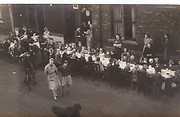 Donated by Geoff Stephenson
Donated by Geoff StephensonA street party - possibly for VE Day? - in Sheriff Street.
More detail » Sisters
Sisters
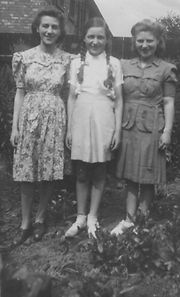 Donated by Mrs. Violet Butcher
Donated by Mrs. Violet ButcherFrom left to right, the three sisters, Violet, Joan and Olive Forstad, standing at the back of their mother Jane's house in Pelham Street during WWII.
More detail » Sitting on the doorstep
Sitting on the doorstep
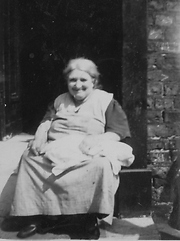 Donated by Mrs. Hazel Brooker
Donated by Mrs. Hazel BrookerMartha Garrington sitting on her doorstep at No.9 Park Street, West Hartlepool, in 1944/45.
More detail » St Joseph's School in two world wars
St Joseph's School in two world wars
ST. JOSEPHS IN A WORLD AT WAR
F.C.J. Annals 1914
‘There was no sound of carol singing or other music in the streets, for the shades of death and suffering lay over Hartlepools. Heart rending details still reach us’.
‘To our great grief we heard that one of our little ones had been killed. When her house was struck by a shell, she and her sister aged four, escaped from the Mother and ran into the street, only to meet her death…. The younger one said: ‘Maggie’s leg fell off – she then sat down and went to sleep, and opened her eyes and died….A child from the infant’s school was so badly injured that her arm had to be amputated in the workhouse hospital.
On the morning of the 18th there was a panic caused through a false report that the Germans were again upon us. The people, terrified by the experiences of the 16th, fled from their homes wild with fear, On our way to school we met women half clothed, unwashed, trailing their children after them and carrying such of their belongings as they could pick up. It took some hours to reassure and calm them and to prevail upon them to return to their homes; but there was no more school after that. We closed for the holidays and returned on the following Monday to put all in order. Great was our astonishment on finding the playground full of children. On being asked what brought them back: The Goose, Mother, the Party! They called out. Not to disappoint them we raffled the goose which fell to the lot of a poor fatherless child. We postponed the party till after the return’.
1915 ‘Attendance is poor after the bombardment. School starts at 9.30 in case there is another attack. Attendance officers’ weekly report sometimes says ‘left town’, ‘scared to death’ ‘suffering from bombarditis’. Tea party encouraged nearly all to return! ‘There is scarcely a child without someone in the firing line.’‘No meetings of the Guild of St. Agnes in the evenings as the unlit streets are unsafe’.
There was still time for celebration even in the darkest days of war. ‘Empire day celebrated with flags and patriotic songs. One passer by said’ I have been round several schools but yours beats them all’.’ ( F.C.J. Annals 1915)
Mr. W. Thomas left the school in 1915 to join the Navy.
The war provided the opportunity for some recycling 1916 style!! The school staff and children were asked to do some government work for the soldiers.‘O gruesome thought’ the staff and children of the school had been asked to make sacks from old dirty sacks of different sizes that would be filled with chaff and used for bayonet practice. ‘Of course all other work had to be set aside and for some days the school not only looked but smelt like a rag warehouse. There were sacks to the right of us and sacks to the left all day long…Of course the children were delighted and never attended so well or so early….One child pricked her finger and blood poisoning ensued but with no serious results.’ ’ ( F.C.J. Annals 1916)
In a raid ‘one of the teachers injured and everything in her house destroyed except a picture of St. Anthony on the wall’.
‘Through out the year the older girls worked hard knitting scarves socks and mittens, one of the parents said ‘what with this knitting we can’t get the children to do nothing else’. Each month the children received honourable mention in the Mail and 2 of the teachers were presented with brooches with the letters WW (War work) – making head bandages for the VAD and lunch bags for the soldiers rations’.
14th, 15th and 18th of March 1918
‘…Air raid last night. Bomb fell near the school and shattered all windows at East end of the school. Not possible to carry on this morning.’
‘…Guard of soldiers in one of the rooms to protect the property’.
‘Found school in use as military billet for soldiers guarding the houses near…classes compressed into four rooms and work proceeds’.
The end of the War was a cause for great rejoicing. In November 1918, all the ‘Picture Halls (were) open free to children every afternoon during the week in honour of the conclusion of the war. Only 82 children attended school that week’. There were Peace Teas, parades and celebrations throughout the town.
In 1919, ‘Mr. Thomas Connolly returned after three years army service. He obtained a commission and was badly wounded in the ankle but is now happily recovered.’ There is no mention of Mr. Thomas who joined the Navy in 1915.
In 1921 there must have been great sadness mingled with pride as a memorial tablet was unveiled in honour of ‘102 boys of St. Joseph’s who fell in the Great War’.
Second World War
June 20th 1940 St. Joseph’s Boys’ school log book
‘During the night an air raid took place. A bomb dropped in Whitby St., close to the east end of the Boys Dept., caused very considerable damage to the whole building , so that it is most improbable that the present buildings will ever be used again.
After reporting the extent of the damage to the Education Offices, the teachers proceeded to salvage as much as possible. We were able to remove from the Headmaster’s room, which was completely wrecked, all the permanent records, Log Book, Admission Registers etc. etc.
June 21st and 22nd
Work of salvage continued – saving as much as possible of the perishable stock. Rain on June 21st damaged much of stock.
‘On the night of 19th June 1940, 12. 10 Am., six high-explosive bombs were dropped in the streets and on the houses in the neighbourhood of St. Joseph’s school. The school was shattered, window panes blown in etc. It was impossible to use the school. For one week the teachers attended daily, doing salvage work under very difficult conditions….after about a fortnight, classes were held in the Corporation Hall, Pilot St.; The Guides Hall, Osborne St.; Miss Egglestone’s, Surtees St., and two classrooms in the Convent Grounds. (St. Joseph’s girl’s school log book)
In 1940 Mr. Coleman, Mr. Beldon and Mr. Timlin were called up for military service.
Many of the children had Fathers fighting around the globe and had not seen them for years. The F.C.J. Annals of 1944 tell a sad tale. ‘One of the priests present at the Christmas party, a Chaplain to the Forces and a former curate of St. Joseph’s Parish, was claimed by several of the “fives” and “sixes” --- “He’s my daddy”. “No, he’s not, he’s mine”, and they crowded round him, attracted by the uniform which they had perhaps seen their daddy wear. It was very pathetic: many of the children have no remembrance of their father.’
More detail » Stan and Mollie
Stan and Mollie
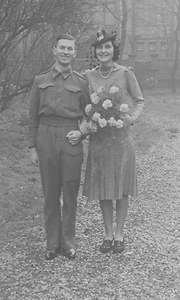 Donated by Mr. John Watson
Donated by Mr. John WatsonDated 1941
Stan Warwick and his new bride Mollie (Keenan), in 1941.
More detail » Still in uniform
Still in uniform
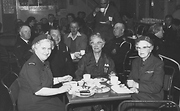 Donated by Mrs. Violet Butcher
Donated by Mrs. Violet ButcherCivil Defence Volunteers continued to be active even after the war came to an end. Here Bert Forstad (far left, to the back), and Wilf Forstad (centre right), are enjoying a cup of tea and a cake at a local cafe or canteen.
More detail » Street party
Street party
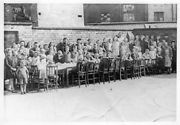 Donated by Hartlepool Library Service
Donated by Hartlepool Library ServiceA street party in an unknown street in the Hartlepool area. Probably to celebrate the end of ww2.
HHT&N 442
More detail » The Four Mudd Lads
The Four Mudd Lads
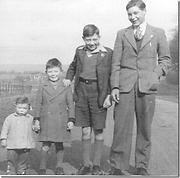 Donated by Mr. Eric Mudd
Donated by Mr. Eric MuddDated 1945
The four Mudd lads behind the Park on the way to Elwick in 1945. From left to right: Eric, John, George and Brian.
More detail » Tin Boxes Factory Bomb Damage
Tin Boxes Factory Bomb Damage
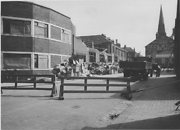 Donated by Hartlepool Museum Service
Donated by Hartlepool Museum ServiceDated 1940
The factory opened in 1927 in Thornton Street. This shows the side of the building after being bombed in an air raid on 21 July 1940. The premises of Cecil M Yuill, Builder, is to the right of the view.
More detail » Tin Boxes Factory Bomb Damage
Tin Boxes Factory Bomb Damage
 Donated by Hartlepool Museum Service
Donated by Hartlepool Museum ServiceDated 1940
Workmen start to clear the site after the factory was bombed during an air raid on 21 July 1940.
HHT&N 44
More detail » Training the ARP
Training the ARP
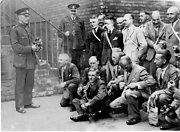 Donated by Hartlepool Museum Service
Donated by Hartlepool Museum ServiceInspector C. Middlewood of East Boldon training men for ARP instructors at the West Hartlepool Police station.
More detail » Tristram Avenue 1930s
Tristram Avenue 1930s
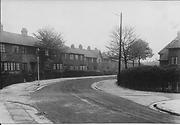 Part of the Library collection collection
Part of the Library collection collectionDated 1935
Taken looking towards Shakespeare Avenue, the street running across the photograph is Bede Grove. The houses were built in the mid 1920s. In 1941 six people were killed by an enemy air raid on this spot.
HHT&N 134
More detail » Two men and two bombs
Two men and two bombs
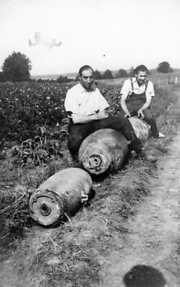 Donated by Hartlepool Library Service
Donated by Hartlepool Library ServiceTwo men with two unexploded bombs dropped in the Elwick area during ww2. I don't think I would be getting that close!!!
HHT&N 440
More detail » V.E. Day in Everett Street
V.E. Day in Everett Street
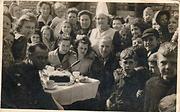 Donated by Mr. Paul Colin Hodgson
Donated by Mr. Paul Colin HodgsonDated 1945
Celebrating V.E. Day in Everett Street in 1945. The lady just in shot on the left is Minni Christal and the little girl popping her head over her left shoulder is her daughter Mary Lees (nee Christal).
More detail » VE Day in Christopher Street
VE Day in Christopher Street
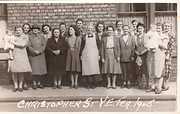 Donated by Geoff Stephenson
Donated by Geoff StephensonDated 1945
VE Day photograph taken in Christopher Street. Hannah Stephenson is on the far right, and Winifred Stephenson is the eighth adult from the right.
The baby on the left is Maureen Liddell. The gentleman on the back row is Percy Liddle. His wife Alice (Alison) nee Robinson is sixth from the left on the front row.
Seventh from the left on the front row is Elizabeth (Lizzie) Barnett (nee Lipton) and mother of Alica and Connie.
More detail »
 VE Day in Mozart Street
VE Day in Mozart Street
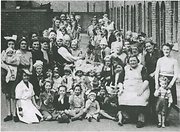 Donated by Hartlepool Museum Service
Donated by Hartlepool Museum ServiceA street party in Mozart Street, West Hartlepool. Many in the group are showing the victory symbol.
This image includes residents of Green Street which backed on to Mozart Street. Mr Terence Briscoe lived in Green Street and has provided us with some of the names of his family and his memories.
His mother Ethel (nee Cleary) is the person third on the left, standing. His brother, John is slightly on her right with a paper hat on his head. His sister Maureen is on the first row second from the right, sitting. Terence himself is the half face below his mother.
The lady on the right sitting on a chair was a self appointed leader of the two streets, a comparable of Ena Sharples of Coronation Street.
Mr Briscoe notes that very few men are in the photograph."The spirits were high on this day and the men were high on spirits. The landlord of the Burn Hotel which was only a stone(d) throw away evidently had tried to increase the alcoholic populace by donating a couple of barrels of Cameron's Beer".
More detail »
 Violet Forstad - Land Army girl
Violet Forstad - Land Army girl
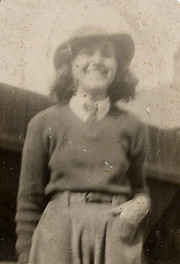 Donated by Violet Butcher
Donated by Violet ButcherThis is a photograph of Violet Forstad taken during the Second World War, when she served in the Women's Land Army on the 'Home Front'.
More detail » WW 2 building Easington Road
WW 2 building Easington Road
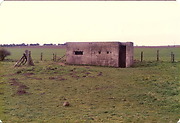 Created by Bill Henderson
Donated by Bill Henderson
Created by Bill Henderson
Donated by Bill HendersonTaken around 1985 a remnant of World War 2 now demolished to make way for Bishop Cuthbert estate. Defence post or air raid shelter.
More detail » Waiting to go
Waiting to go
 Donated by Mr. John Brooker
Donated by Mr. John BrookerDated 1940
Kip Herring (right), B. Cowan (centre), and G. Wilson (left), on the promenade in 1940.
More detail » War gases
War gases
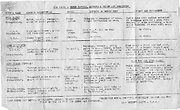 Donated by Mrs. Jean Sutherland
Donated by Mrs. Jean SutherlandDated 1943
An information sheet given out to volunteer Henry Robertson when attending an Anti-gas Training Course in 1943.
More detail » Wartime Catcher Lasses
Wartime Catcher Lasses
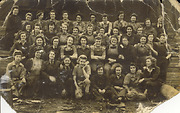 Donated by Sandra McKay
Donated by Sandra McKayA group photograph of "Catcher Lasses" working at Gray's shipyard during the Second World War. Can you identify any of the ladies in this photo?
More detail » Wartime Childhood by P. Stewart
Wartime Childhood by P. Stewart
In 2005 Hartlepool's Museum and Library Services worked together on a project called 'Their Past, Your Future', which commemorated the part played by local people in the Second World War. As part of the project P. Stewart from the 'Writing Together' group reminisced about her experiences as a child during the War. This is her story, in her own words:
My most vivid memory of the war was when I was about ten years old. My family used to go to Hutton Rugby for our holidays in the summer, where we used to rent a bungalow. One night we heard the bombers flying overhead, presumably to “blanket bomb” cities in Europe. They made a distinctive sound flying out, as they were heavy laden with fuel and bombs. We always counted them out and likewise on their return, but the sound of their engines on their homecoming was completely different, as they had dwindling supplies of fuel and their bombs had been dropped.
This particular evening as I counted them back I was certain that there were two which had not returned. My mother, not wanting to upset me, assured me I must have made a mistake. Aircraft which hadn’t returned were said to be “missing” and this was the case the following morning on a radio bulletin. Later that night, I heard an aircraft, in obvious distress – which was always a distinctive sound. Of course, it was the blackout and it was especially dark in the countryside, but as I looked out, I could see searchlights, which were usually used to look for enemy aircraft during an air raid, moving in unison. They must have used searchlights from the whole area. They all moved first up, into the sky, and then, all together, down to the ground, to the same spot, many times over. It was a very moving experience, watching those searchlights moving as if by some unseen hand, guiding the stricken aircraft to its own aerodrome. I assume the lights must have been guiding the aircraft to Dishforth aerodrome, but exactly to which place I cannot be certain.
During the War clothes and food were all rationed. My mother was an expert dressmaker and also good at altering clothes, so quite often I would have a coat or jacket altered to fit me which she had been given by a relative who somehow or other managed to get clothes quite easily. Black market probably! Rationing made life difficult. I think the then council approached the government for extra soap powder as we lived in a hard water area but this was refused. Ration books came in different colours for different age groups; green up to five years, blue up to sixteen years of age – there were extra coupons in this book for shoes for growing feet – and buff for adults, all of which were obtained from the Food Office. Clothing coupons were located in the back of the ration book.
My sister, Jean, was a fire watcher. She volunteered to do this once a week – no pay! She worked with Steam Navigation which was above Lloyds Bank in Church Square. Fire watching entailed looking out for incendiary bombs which might hit the building during an air raid. Two people took it in turns to do this, two from the bank and the next night, two from Steam Navigation. She was only given a stirrup pump to put out any fires, but she never had cause to use it.
When the war had been going on a short while the cinemas and dance halls began to get going again after being closed down at the start and I used to go to the dances – in St Paul’s Hall in Murray Street, (after the soldiers had left who were stationed there for a time) the Dalton Rooms in Dalton Street (I was at a dance there with my brother who was on leave from the Royal Navy when we heard about the sinking of the Ark Royal with the loss of all but three lives). One of the victims was the son of a family friend called Albert Potts and he had only been on the ship for three days.
In all, we in West Hartlepool were fairly fortunate in that we did not have too many air raids, although those we did have caused a fair amount of damage, one of them destroyed the Salvation Army Headquarters which were on Stockton Street where the present multi-storey car park is.
More detail »
 Wartime Co-op advert
Wartime Co-op advert
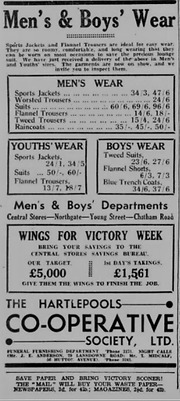 Created by NDM
Donated by Hartlepool Museum Service
Created by NDM
Donated by Hartlepool Museum ServiceDated 1943
An interesting advert from May 1943 for men's clothes. They were available at Co-op Menswear shops in Chatham Road, Young Street, Northgate and at the Central Stores all of which are long gone.
The advert also encourages the public to save with them for the Wings for Victory campaign. There is information for the Co-op Funeral Service in pre Strathmore House days.
Finally at the bottom of the page is a small advert which is part of the wartime waste paper campaign.Readers were given 3d (just over 1p today) for 4 pounds in weight of waste paper.
More detail » Wartime Reminiscence by Violet Butcher (nee Forstad)
Wartime Reminiscence by Violet Butcher (nee Forstad)
In 2005 Hartlepool's Museum and Library Services worked together on a project called 'Their Past, Your Future', which commemorated the part played by local people in the Second World War. As part of the project Violet Butcher reminisced about life on the Home Front. This is her story, in her own words:
I remember the Sunday morning in September when Mr Chamberlain announced on the wireless that Britain was now at war with Germany. Our neighbour was in our house at the time and she burst into tears, at the thought of all the people who would die. Eventually we were issued with gasmasks and had to go to the Town Hall to collect our identity cards and ration books. We had clothing coupons and ration books for meat, butter, lard and sugar. We were allowed one egg per month. We helped out by queuing at the Fish and Chip shop, and standing in long queues for fruit whenever it came in. It was mostly apples, no bananas or oranges. Everyone had to put up blackout curtains. You had to make sure there was no light showing. I remember we had to cover half of our cycle lamps so that light would shine only downwards. It was so dark without any street lights I once rode straight into a wall and another time found myself in the wrong street coming home.
Our family all “did their bit” for the war. My elder brother joined the Air Force. My sister went to Birmingham to work in the factories to replace the men.
I joined the Women’s Land Army and my younger brother joined the Merchant Navy, sailing to Russia with the Convoys. Both my parents and younger sister were in the Civil Defence. Everyone with a garden had Anderson shelters but those without gardens had brick and concrete shelters in the front street. People used them at first but as time went on we decided to stay in our warm beds and hope for the best. Our neighbours’ children were terrified when the sirens went so my mother would get them all in our house, put the Gramophone (which played recorded music) on and all have a sing-a-long.
I did my training for the Land Army at the College of Agriculture at Durham. We shared our dining hall with a group of men who were conscientious objectors. They worked on the farms. They kept themselves very much to themselves but I didn’t hear anyone call them. After all they were still helping with the War Effort by doing farm work. I daresay some people regarded them as cowards I believe the other alternative was to work down the coalmines.
Rationing lasted about eight years I think, so people became quite good at making do. When bedsheets became worn in the centre they were cut through and the side became the middle. When they were past repair they became tea towels and dusters. Old towels became face cloths and floor cloths. People would dye bedspreads to have a change in the bedroom and lots of rugs were made to brighten things up. I can remember dying muslin (very fine cotton) nappies to make net curtains for the kitchen window. You could even eke out your butter ration by keeping the cream from the top of the milk, putting it in a screw top jar and shaking it until a small lump of butter formed. (Lots of shaking needed.) Children could no longer buy sweets so my Uncle who had a bakery opposite the school did a roaring trade in fresh baked hot buns for a halfpenny each.
Some children would take a scrubbed carrot to munch and others would have a little packet of cocoa to dip their finger in. Occasionally you’d be given a little boost. A lady I knew seemed to get extra somehow and she would sometimes give us some sugar or butter. Even a few clothing coupons once, which were very welcome. That was on my birthday.
More detail » Wartime Voyage on the Kathleen Hawksfield
Wartime Voyage on the Kathleen Hawksfield
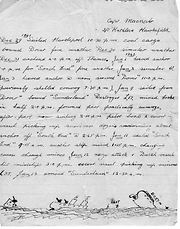 Created by Captain MacNab
Donated by Mrs. Jean Lawrence
Created by Captain MacNab
Donated by Mrs. Jean LawrenceDated 1941
A page from a diary of Captain MacNab describing a voyage from Hartlepool to Dover and back in 1941/42, with a hastily drawn sketch of the events at the bottom of the page.
More detail » Wartime Wedding
Wartime Wedding
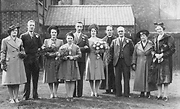 Donated by V. Nicholson
Donated by V. NicholsonDated 1941
The wedding of Laurence Masterson and Bessie in 1941. Laurence drove for United all his life and retired in the late 1960s. Bessie worked in the Steel works during the war, later becoming a bakeress in Morrell's before leaving to have a baby.
More detail » West Hartlepool Home Guard
West Hartlepool Home Guard
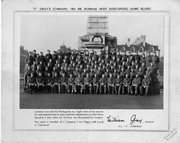 Donated by Hartlepool Museum Service
Donated by Hartlepool Museum Service"F" Gray's Company 18th BN Durham (West Hartlepool) Home Guard. Taken in Victory Square.
More detail » West Hartlepool Home Guard
West Hartlepool Home Guard
 Donated by Hartlepool Museum Service
Donated by Hartlepool Museum ServicePhotograph of the Home guard taken in front of the world war one memorial with Avenue Road in the background. Commanding Officer was J W Cameron.
More detail » West Hartlepool Home Guard
West Hartlepool Home Guard
 Donated by Hartlepool Museum Service
Donated by Hartlepool Museum ServiceGroup photo of uniformed men, with rifles. Outdoors.
More detail » West Hartlepool Home Guard
West Hartlepool Home Guard
 Donated by Hartlepool Museum Service
Donated by Hartlepool Museum ServiceWest Hartlepool Home Guard marching in the rain.
More detail » West Hartlepool Home Guard despatch motorcycle riders
West Hartlepool Home Guard despatch motorcycle riders
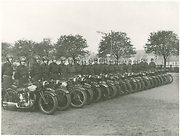 Donated by Hartlepool Museum Service
Donated by Hartlepool Museum ServiceDespatch Riders Group 18 attached to the Home Guard, pictured on the Bull Field (now the site of the Civic Centre). To the left was the Army Barracks, which was also the Motor Transport Department (and supplied the petrol needed for the motor cycles) and the Armoury.
3rd from the Left: Stan Smith –Dirt Track Rider
5th from the Left: Geoff Saunders
14th from the Left: Charlie Dutton – Dutton’s Garage opposite Travellers Rest
1st from the Right: name unknown but he was Manager of the Staincliffe Hotel
4th from the Right: Guy Perry – Lodged at Rium Terrace. Lived in Biggleswade, became director of Convair Aircraft Company in Canada
5th from the Right: John Proudlock
8th from the Right: Don Kirkpatrick
The last 6 riders on the right were apprentices at CMEW and Richardson & Westgarths.
More detail »
 West Hartlepool Home Guard despatch motorcycle riders (2)
West Hartlepool Home Guard despatch motorcycle riders (2)
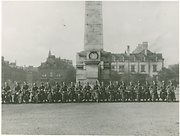 Donated by Hartlepool Museum Service
Donated by Hartlepool Museum ServiceWest Hartlepool Home Guard despatch motorcycle riders in Victory Square, Hartlepool.
More detail » William Gray Catcher and Heater Lasses - 1943
William Gray Catcher and Heater Lasses - 1943
 Donated by Mrs. Sharp
Donated by Mrs. SharpDated 1943
Group photo of "Catcher and Heater Lasses", at Gray's Shipyard in 1943. This photograph appeared in the "New York Mail" newspaper.
More detail » William Nicol Caricatures
William Nicol Caricatures
A series of caricatures by William Nicol and held by Hartlepool Museum Service.
More detail » Women in the shipyards
Women in the shipyards
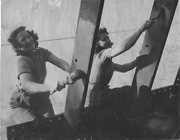 Donated by Hartlepool Museum Service
Donated by Hartlepool Museum ServiceTwo women painting a ship in the Shipyards during WW2.
More detail » Women in the shipyards
Women in the shipyards
 Donated by Hartlepool Museum Service
Donated by Hartlepool Museum ServiceNote regarding women working in the shipyards.
More detail » Women in the shipyards
Women in the shipyards
 Donated by Hartlepool Museum Service
Donated by Hartlepool Museum ServiceWomen in the shipyards just finishing their shift during WW2.
More detail » Women shipbuilders descending the gangway
Women shipbuilders descending the gangway
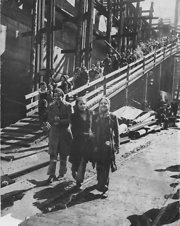 Donated by Hartlepool Museum Service
Donated by Hartlepool Museum ServiceWomen shipbuilders descending the gangway during WW2. It could be lunchtime or the end of their shift.
More detail » Women shipbuilders descending the gangway
Women shipbuilders descending the gangway
 Donated by Hartlepool Museum Service
Donated by Hartlepool Museum ServiceNote regrading the picture.
More detail »




